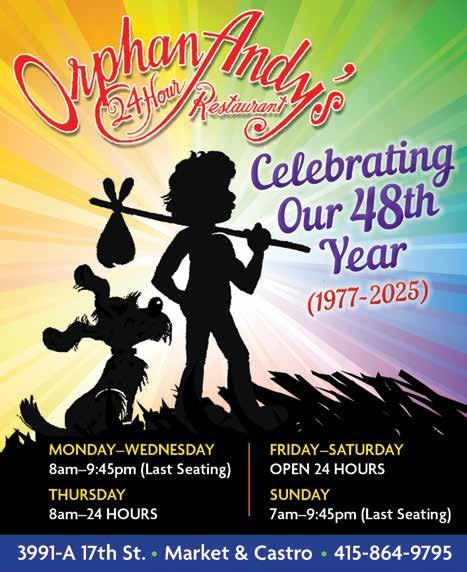

LGBTQ News & Calendar for the Bay Area

CELEBRATING FOUR DECADES Est . 1978









































LGBTQ News & Calendar for the Bay Area

CELEBRATING FOUR DECADES Est . 1978






































The Transgender Day of Visibility is observed worldwide each year on March 31, with this year’s observance holding all the more importance given intensifying vitriol and attacks against trans people led by a vocal but loud minority that includes President Trump and many in his administration.
As GLAAD reports: “We are seeing a continued year-over-year increase in antiLGBTQ bills, including more than 450 antiLGBTQ bills introduced in state legislatures across the country, according to the American Civil Liberties Union. In addition to these legislative attacks, trans people continue to face direct physical violence, declared an ongoing epidemic by the American Medical Association since 2019, which disproportionately affects Black trans women. That’s why it’s still necessary for trans people to be seen through authentic, diverse, and accurate stories, which reflect the actual lived experiences of trans people, both for themselves and for the people who believe they’ve never met a trans person.”
GLAAD adds that trans people are often excluded in coverage by major news outlets.
“By excluding trans people in covering issues facing the community, including excluding knowledgeable experts who are trans, and by lacking trans representation in newsrooms to help guide coverage, anti-trans discrimination is often misrepresented in the news as a ‘culture clash’ and ‘just asking questions’ rather than as willful misinformation and targeted hate,” the organization shares. “This oversight has real implications that shape how Americans view and understand trans people.”
It is within this media and political landscape that the San Francisco Bay Times highlights Bay Area transgender leaders—those who are either presently or formerly based in this region who have made a significant beneficial impact on the transgender community and the LGBTQ+ community as a whole. Some are nonprofit leaders, while others are performers, healthcare professionals, artists, and more. The Bay Area transgender


community evidences vibrant diversity in every respect, existing in stark contrast to the anti-DEI Trump administration.
Since the Transgender Day of Visibility was first established in 2010—by trans advocate
Rachel Crandall, the head of Transgender Michigan—it has been observed both nationally and internationally. Many look to the San Francisco Bay Area, which still serves as a beacon of LGBTQ+ acceptance, particularly for those in countries where gender expression and same-sex activity are criminalized under the guise of “social cleansing” and public order offenses.
The Bay Times is therefore proud to honor local transgender leaders. There are many more not included in this issue, as volumes would be needed to do proper justice to these influential and powerful contributors to our quality of life here in Northern California. You can celebrate, in person, several such leaders and the transgender community at the San Francisco Trans Day of Visibility Celebration on March 30 (a day before the official observance) at The Green Room, 401 Van Ness Avenue, San Francisco, from 6–9 pm.
For resources and a listing a additional related local events, go to: https://bit.ly/4kWZpgl
To learn more about The Transgender Day of Visibility, visit: https://bit.ly/4iOEhY3
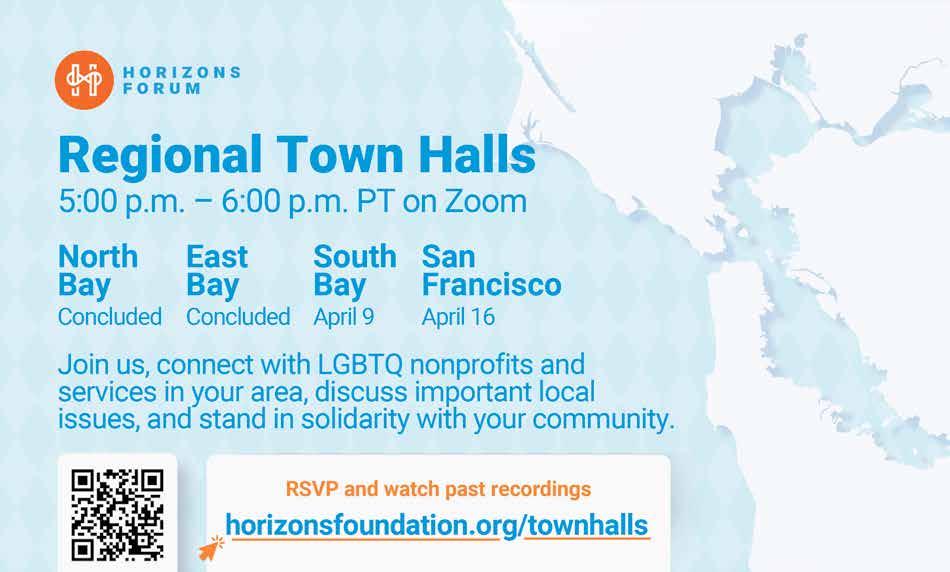

San Francisco is the city with the highest population of out transgender individuals, according to many surveys, with New York, Austin, Portland, Seattle, Boston, New Orleans, Columbus, Salt Lake City, and Atlanta also often mentioned in the top 10. As a beacon for the global transgender community, San Francisco is also a base for world-class transgender leaders.
In this issue of the San Francisco Bay Times highlighting the Transgender Day of Visibility on March 31, 2025, we honor just some of the many transgender leaders who are living out and proud lives and making a positive difference benefiting countless others.

Star Amerasu is a multi-hyphenate force redefining artistry in 2025, seamlessly merging music, film, nightlife, and digital media. She skyrocketed to prominence with her futuristic, camp-infused sketches, earning praise from cultural heavyweights like Lil Nas X and Hari Nef.
She is a talented musician and her critically acclaimed album Never, Really Alone and electrifying DJ sets have cemented her as a nightlife icon, performing at LA Pride, opening for Peaches, and curating high-energy experiences. In film, she debuted I Guess ... at Outfest and premiered After Hours, executive produced by Elliott Page, at Frameline and NewFest. Unafraid to innovate across platforms, Amerasu is reshaping the cultural landscape with fearless creativity.

Carlo Gómez Arteaga is an experienced organizer, advocate, fundraiser, and trainer with over 28 years of experience focused on youth equity, LGBTQIA+, and immigrant rights. Currently the Co-Executive Director for the Transgender District in San Francisco, he supports the organization to create an urban environment that fosters the rich history, culture, legacy, and empowerment of transgender people and their deep roots in the southeastern Tenderloin neighborhood of San Francisco.
Arteaga is the Co-Founder of many groups including People United for the Legalization of Students as well as Grupo de Apoyo Fénix. He previously directed an anti-poverty statewide campaign and coordinated donor development with the Dolores Huerta Foundation.

Spring Collins (she/they) is a passionate advocate for the queer and trans community with extensive experience in fundraising, community organizing, and trans-centered programming. She is currently the Senior Individual Giving Associate at the SF LGBT Center. Collins has spent years cultivating connections and supporting LGBTQ+ initia-
tives. From 2022 to 2024, she served on the SF Pride Board, holding the position of Secretary during their final two years.
She played a key role in the relaunch of the Trans Stage at SF Pride in 2022 and is now a Co-Producer of the Trans Liberation Bloc Party with Lexi Adsit of Peacock Rebellion in partnership with TRANScend Retreat. As a Co-Founder and Program Director of TRANScend Retreat, established in 2017, Collins has been a driving force behind creating spaces that center and uplift trans and gender nonconforming individuals.

Pau Crego (he/him) is an advocate and educator with a passion for advancing equity for transgender, LGBTQI+, and immigrant communities through policy, public health programming, and education. Crego’s social justice and public health work over the past two decades has included direct action, social services, training and education, as well as program and policy design and implementation. He is also a published author and translator in the fields of public health and trans equity.
From 2017–2023, Crego held various leadership roles at the San Francisco Office of Transgender Initiatives, where he led the allocation and implementation of government resources to address equity gaps for trans San Franciscans, developed local and state nondiscrimination policies, and led the creation of San Francisco’s trans equity flagship programs. He is currently a Professor in the Community and Public Health Department at City College of San Francisco, Co-Director of the Foundations Consulting Group, and an executive coach for leaders in public service and nonprofit settings. You can learn more about Crego’s work at https://paucrego.com/
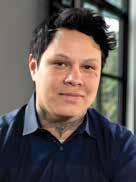
Whit Joaquin Guerrero (he/him) is a housing justice leader, transgender advocate, mediator, facilitator, and capacity coach. He serves as a Commissioner for the Homelessness Oversight Commission for the City and County of San Francisco and was the inaugural director of the first city-funded transgender housing portfolio, Our Trans Home.
Guerrero co-founded the first Transgender Navigation center, the Taimon Booton Navigation Center; co-envisioned the Plan to End Trans Homelessness that was the first initiative to reach effective zero homelessness for trans and gender non-conforming San Franciscans; and has served as an expert witness on transgender issues for the Public Defenders Office of San Francisco He utilizes his personal experience and the guidance of his transgender elders to implement cultural competence toward the liberation of trans people in San Francisco.

Ebony Ava Harper is a first-generation American born to a Jamaican immigrant family. Having come out as a Black trans woman at an early age, Harper began working as an activist in the trans community, emphasizing the importance of the intersectionality between her racial and transgender identity. Over the years, she has transitioned from a trans activist to a human rights activist, making a difference for marginalized communities both locally and nationally.
She is the Executive Director of California TRANScends, a statewide initiative she founded to promote the health and wellness of transgender people throughout the state. Harper continues to push for equality and justice as Chair of the California State Transgender Advisory Council. She also serves on the boards of the Transgender Law Center, Mirror Memoirs, and the Museum of California. Her work has earned her national recognition, including the Stonewall Four Freedoms Award, Equality California’s Community Leadership Award, and multiple honors from the California Legislature.

The story of J Jha is a testament to resilience, identity, and community. As a transgender, gender non-conforming individual, his journey to U.S. citizenship is marked by both triumph and loss, becoming a citizen the same day her father passed away after a 15-year wait. This bittersweet moment reflects the complexity of their path, balancing joy and grief.
As an actor, J explores and amplifies gender diversity through contemporary and ancestral narratives, bridging past and present to foster understanding. Her work highlights the richness of transgender experiences, creating spaces for connection and visibility. They are deeply involved with trans elders in San Francisco, particularly through Openhouse, an organization supporting LGBTQI++ seniors. This intergenerational exchange provides wisdom and solidarity, as he contributes to the well-being of those who paved the way for younger generations. J lives by a philosophy of presence and purpose, striving to leave the world better than they found it.

Honey Mahogany grew up in San Francisco and received her master’s in social welfare from UC Berkeley. She has experience working in government at both the county and statewide level, as well as 20+ years of experience working with LGBTQI2S+ youth, adults, and seniors as a direct service provider, programs director, and advocate.
Her work has earned her recognition from the City and County of San Francisco, the State of California, and
(continued on page 5)

(continued from page 4)
awards from numerous organizations including Bay Area Lawyers for Individual Freedom, The GLIDE Center for Social Justice, and the Women’s Foundation of California.

Toni Newman is the Director of The Coalition for Justice and Equality Across Movements and the Acting Director for the Training Center to End the Epidemic at NMAC. She was previously the Interim CEO of the Black AIDS Institute and Interim President of the LYRIC Youth Foundation. She is the Chair of the Board of Directors/ Managing Director for TransCanWork, and serves as a Member of the California Black Leadership Council.
Newman was the Interim Director of Employment Services at the SF LGBT Center, Executive Director for St. James Infirmary, and the Director of Development for Maitri Compassionate Care AIDS Hospital. She previously served as the Interim Director of Development and communications at To Help Everyone Health and Wellness Centers and as a Strategic Fundraiser, Volunteer Recruiter, and Legislative Aide for Equality California. Last year she received awards for advocacy from the National Bar Association and The Williams Institute at UCLA. She additionally was awarded the 2024 National Nonprofit Leader of The Year from the Anthem Awards.

Marcel Pardo Ariza (they/ he) is a Colombian trans visual artist, educator, and curator. Their work delves into queer and trans kinship through photographs, installations, and public programs developed in close collaboration with performers, artists, educators, policymakers, and organizers. Pardo Ariza’s practice is dedicated to ensuring the dignified presence and visibility of trans people of color and migrants in artistic and cultural spaces.
In 2020, to commemorate the 50th anniversary of Pride, they presented Kin Streets, an 18-poster series on Market Street in collaboration with the SFAC and GLBT Historical Society, featuring 60 members of the LGBTQIA+ community. Their project I Am Very Lucky, Very Lucky to Be Trans, created in partnership with 33 trans, intersex, and gender nonconforming leaders from the Bay Area, was recently acquired by SFMOMA’s permanent collection as a significant piece of trans history in San Francisco. Pardo Ariza also curated Juanita MORE!’s 30-year retrospective at the San Francisco Arts Commission Galleries and is currently collaborating with The Transgender District on the HIRE TRANS FOLKS initiative to promote inclusive employment for trans people. Most recently, they organized DRAGFUTURA, SFMOMA’s first drag pageant featuring an all-BIPOC cast of performers. Pardo Ariza also serves on the board of El/La Para Trans Latinas.

Jupiter Peraza is a transgender advocate, community organizer, policymaker, SFSU alum, and DACA recipient. She began community organizing in 2018, focusing on civic engagement and social justice. In 2020, she launched a national virtual phone bank to help defeat Donald Trump, mobilizing hundreds of volunteers. As Director of Social Justice at The Transgender District in 2021, she authored the proclamation declaring August as Transgender History Month in San Francisco. In 2023, she collaborated on HR57 with Assemblymember Matt Haney, Honey Mahogany, and Dr. Susan Stryker, making it official statewide.
In 2022, she wrote the initiation ordinance to landmark the Turk & Taylor streets intersection with San Francisco’s Historic Preservation Commission. She is a Women’s Foundation of California Dr. Solis Policy Institute fellow, she was Senate District 11’s 2022 Woman of the Year, and served on the SF Democratic County Central Committee. She currently sits on OTI’s Transgender Advisory Council and works with California’s Department of Aging, UCSF School of Medicine, and UC Berkeley’s CITRIS Research Institute as Manager of Statewide Coalition at Openhouse, leading California’s first study on the aging experience of LGBTQIA+ older adults. She sits on San Francisco Pride’s Board of Directors, and was recently elected as a delegate to the California Democratic Party representing Assembly District 17.
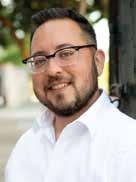
Maceo Persson is a powerhouse of passion, advocacy, and policy expertise, dedicated to making real change where it matters most. His journey began in Oregon with Basic Rights Oregon, where he played a key role in securing LGBTQ+ inclusive nondiscrimination protections and domestic partnership laws— proof that grassroots power and policy change go hand in hand. After eight years of movement-building in Oregon, he took his talents to California, joining the Transgender Law Center to champion trans-inclusive healthcare policies and strengthen state nondiscrimination laws. Next stop? City Hall. As Director of Communications and External Affairs for San Francisco’s Office of Transgender Initiatives, Persson worked to ensure TGNC voices were not just included but centered in city policies and programs.
Now, Persson continues his mission at the Department of Disability and Aging Services, where he leads special projects that support programs and services for LGBTQ+ older adults and disability communities—ensuring that inclusion and accessibility remain top priorities in San Francisco. Beyond his government work, he served six years as a board member and co-chair of the SF LGBT Center, being the first trans co-chair of the organization. He currently is the Vice President of San Francisco Pride, working hard to ensure that we have a space to educate the world, commemorate our heritage, celebrate our culture, and liberate our people!


Anjali Rimi is a pioneering transgender leader, immigrant rights advocate, and equity champion whose work has transformed countless lives. A proud Kinnar Hindu woman born in India, blossomed in Canada, and belonging in the U.S., she has dedicated her life to uplifting marginalized communities and ensuring dignity, safety, and opportunities for all. As President of the Center for Immigrant Protection, home to The LGBT Asylum Project and ParivarBayArea, Rimi leads groundbreaking efforts to provide legal services and social integration for LGBTQIA+ asylum seekers. She also holds responsibilities as an Equity Officer at San Francisco’s Department of Homelessness and Supportive Housing.
Rimi has made history as California’s first transgender Indian civil service officer and the first Indian transgender person recognized at the California State Capitol. She founded the world’s largest trans entrepreneurship program and spearheaded one of the largest global LGBTQIA+ COVID relief efforts, including the SF LGBTQIA+ COVID Relief Coalition. A survivor of violence, hate crimes, and homelessness, Rimi’s journey is one of resilience. Despite facing immense challenges, she earned an MBA and built a 20-year career spanning technology, social services, food & beverage, and fashion. Her leadership and advocacy have earned her numerous accolades, including being named Woman of the Year by the U.S. Congress in 2023.

Jessy Ruiz is a transgender immigrant who was born in Morelia, Michoacán, Mexico. She experienced discrimination there and then lived for 14 years in North Carolina, where the LGBTQ+ community at the time lacked access to support services. In 2017, she arrived in San Francisco, fleeing violence again. Here she found likeminded others as well as organizations and groups with members who saw her potential.
She now works for the Mission Neighborhood Health Center, an organization that provides services to the homeless. She has been a Commissioner on the Immigrant Rights Commission for the past four years and has held leadership roles in organizing marches and rallies. In January 2025, she started the nonprofit Voces Trans Latinx, which works to provide services to the trans and LGBTQ+ communities. Her life and work are deeply connected to the LGBTQ+ community of San Francisco and she continues to fight for a more inclusive and just future.

The transgender community is now on the frontlines of LGBTQ+ activism in the U.S. In recent months, this has largely been in response to the federal government rolling back protections for transgender Americans while ramping up negative rhetoric that has affected the national discourse on basic rights for LGBTQ+ individuals and particularly those who are transgender.
The San Francisco Bay Times recently asked some of the Bay Area’s most prominent transgender leaders to identify the primary issues that are most impacting the transgender community now. Their responses will hopefully serve as a call to action for LGBTQ+ activists and allies to help resolve these challenging problems that ultimately affect all of us.
Star Amerasu
Transgender people represent a small portion of the population, yet the disproportionate media focus on us often portrays us negatively. This not only dehumanizes us, but also diverts fiscal resources into creating division. We must foster understanding. Additionally, young trans and queer individuals face relentless bullying, which is compounded by governmental policies that marginalize us. Such actions are counterproductive, and harm our society as a whole.
Housing instability is a critical issue for the transgender community. Trans people face higher rates of homelessness, often due to job discrimination and lack of support systems. My own experience of homelessness at age 20 highlighted the need for accessible housing and employment opportunities. We must ensure that all people, including trans individuals, have a safe place to live and the same opportunities to thrive
Currently, there’s an alarming trend of division within the LGBTQ+ community, with some attempting to distance themselves from the trans community. Historically, in the 1950s, 60s, and 70s during the Gay Liberation Movement, the LGBT community stood united against legalized oppression. It’s essential that our gay and lesbian brothers and sisters stand with the trans community now, showing solidarity. We must present a united front to the world. If trans rights are under attack, the entire LGBTQ+ community is at risk. We must band together to ensure our collective safety and rights.
Carlo Gómez Arteaga
Transgender individuals face significant challenges, including discrimination and violence, which can be addressed through comprehensive anti-discrimination laws, education, and support services, while also combating Trump’s anti-trans rhetoric by promoting positive narratives and holding leaders accountable.
Access to affirming healthcare remains a major barrier, necessitating removal of barriers, making sure providers are trained, and
there is access to insurance coverage for gender-affirming treatments and community health programs, alongside efforts to counteract harmful policies that restrict transgender rights.
Legal recognition of gender identity is also crucial, requiring policy reforms, international advocacy, and public awareness campaigns to ensure equal rights and protections, while actively opposing political rhetoric that undermines transgender dignity and inclusion.
Issue #1: Attacks on Trans Bodies and the Misinformation Campaign
The federal government has escalated attacks on trans rights through harmful legislation and policy rollbacks.
A widespread misinformation campaign has scapegoated trans people, fueling stigma and discrimination.
Solutions
Strengthen alliances with organizations and advocates committed to trans liberation.
Uplift and center Black trans leaders in advocacy and media narratives.
Mobilize communities to call representatives and demand the protection of trans rights. Support campaigns that boycott and divest from corporations that harm the trans community.
Issue #2: Funding for Grassroots-Led Organizations
Smaller, trans-led grassroots organizations often lack adequate funding to sustain their critical work.
Larger LGBTQ+ organizations and philanthropic institutions frequently receive disproportionate funding.
Solutions
Establish funding pipelines by encouraging larger organizations to allocate resources to grassroots groups.
Engage cis/hetero allies in individual giving and encourage them to amplify the work of trans-led organizations.
Develop transparent funding networks that prioritize underfunded trans initiatives.
Issue #3: Institutionalized Racism, Trans Misogyny, and Violence
Black trans individuals are disproportionately targeted by systemic violence, murder, and harassment.
Institutionalized racism and trans misogyny remain pervasive, impacting the safety and well-being of trans communities.
Solutions
Implement widespread education programs that promote trans-inclusive perspectives and challenge anti-Blackness.
Advocate for the accountability of perpetrators and systemic reforms within the criminal justice system.
Expand access to mental health and grief support services for those most impacted by violence.
Develop community-led safety networks and restorative justice practices.
These issues are interconnected and require a multifaceted approach. By addressing systemic violence, uplifting BIPOC voices, and ensuring equitable funding, we can build a safer, more inclusive future for all trans people.
Pau Crego
I believe that the top three issues facing trans communities locally are homelessness, mental health, and economic barriers—all of which are caused by a combination of institutional transphobia and interpersonal antitrans bias.
The little research on trans communities shows what we have known all along: that trans people—and even more so for BIPOC, immigrant, disabled trans people, and elders—experience shockingly high rates of homelessness and poverty compared to the general population. In turn, these and other forms of discrimination deeply impact our mental health, even more so when anti-trans rhetoric is rising across the world and our national government is attempting to erase us.
While local governments, organizations, and community members are making important strides to address these inequities and to protect us from harm, meaningful change in these areas will take time and courageous leadership from all of us. We can, and must, continue to advocate for laws, policies, and practices that protect trans communities. We—especially our cisgender allies—need to continue speaking up in the face of anti-trans rhetoric both in public and in private in order to resist the normalization of anti-trans violence. And finally, we must remember to also support trans people in our daily lives, by treating each other with the care and love our communities deserve.
At a time when legislation is specifically targeting transgender people, we need all people who care about trans people to call their local and state legislators and demand legal protections for trans people, for the government and the philanthropic sector to fill the gaps on any services cut by the new administration, especially in the area of healthcare for trans people.
There is a lot of disinformation being spread by the new administration about what it means to be trans. We understand that many Americans don’t know a trans person and have only been exposed to ideas of us they have been fed by the media. We need all people with media platforms to continue investing in campaigns that show us for the regular humans that we are, living normal lives as so many of us do. We need to have trans people being the ones speaking to our experiences in the media—not others about us without us.
We need all businesses, corporations, and local governments to create employment programs and opportunities for trans people to become gainfully employed and receive leadership positions that showcase our level of competency, decency, and brilliance. We have always been major contributors to culture, healing, and community. Society at large benefits from having trans representation and has for centuries. We are not new here.
Too many of our trans sibs face barriers to gender-affirming and lifesaving care. We need policies that protect and expand access, more trans-led clinics, and investment in providers trained to deliver affirming services.
High rates of unemployment, housing insecurity, and workplace discrimination continue to plague our community. We need targeted workforce development, protections against discrimination, and trans-owned business support.
Trans people, especially Black trans women, are disproportionately affected by hate violence. We need to address root causes like transphobia, racism, and poverty while investing in community-based safety and prevention programs that don’t rely on carceral systems.
The transgender community faces immense challenges, but three critical issues stand out: erasure, systemic oppression, and attacks on love and humanity.
Erasure of Transgender Realities Transgender histories and identities are often erased, silencing their voices and contributions. To combat this, we must amplify and immortalize transgender stories through art, media, and education, ensuring their legacies are visible and celebrated.
Across America, transgender identities are under legislative attack, with bills targeting healthcare access, participation in sports, and even the right to exist publicly. These laws perpetuate violence, discrimination, and marginalization. Addressing this requires grassroots organizing, legal challenges, and public advocacy to push back against harmful policies and protect transgender rights. Attacks on Love and Humanity Fascism, oligarchy, and division threaten democracy, compassion, and the rights of marginalized communities. Defending love and humanity means building alliances, standing united across differences, and showing up in every arena—streets, boardrooms, media, and online platforms.
(continued on page 7)

(continued from page 6)
To create change, we must act collectively. This means fighting for justice, preserving transgender legacies, and protecting democracy with unwavering resolve. By joining hands, amplifying marginalized voices, and resisting oppression, we can build a world where love, equity, and humanity prevail. The time to act is now—our collective future depends on it.
Honey Mahogany
Erasure of Trans Identity
Attempts to criminalize trans people are escalating. It started with bans on drag that were worded vaguely enough to impact trans people. Now, in Texas, for example, the state legislature is attempting to ban all gender-affirming care for trans people regardless of age and has introduced legislation that would make identifying as trans a felony. These attacks are exacerbated by the EO’s from the Trump administration preventing trans people from accessing passports that align with their gender, removing any reference of trans people from federal websites, etc.
Lack of Vocal Allyship
There is a lack of vocal allyship both from cisgender people, the broader LGB community, and elected officials. At this time of heightened scrutiny against the transgender community, we need our allies to be champions of trans issues, as trans issues are intertwined with many other communities’ issues. The fight for trans community is intersectional, and aligned with women’s rights, immigrants’ rights, and the rights of so many other communities. Trans rights are at the front of the chopping block, but everyone else’s rights are right behind us. To combat this, we encourage people to publicly state their support for trans people, especially elected leaders and those with privilege and platform to create change and provide protections.
Relocation
Following the wave of anti-trans legislation across the country, more trans people are fleeing hostile states and coming to places like San Francisco, where trans communities have protections. However, especially here in San Francisco, trans-serving organizations are already at capacity and coming up against a tough budget year with a serious deficit in the city’s budget—this is in addition to potential federal funding cuts and the backpedaling of corporate and philanthropic funding amidst the rising trend of divestment from Diversity, Equity, & Inclusion (DEI) initiatives. Cities like San Francisco and states like California must do more to shore up trans services through additional budgetary investments, and allies should get involved now and demand that their city leaders to more to support the trans community. What can be done? Keep sharing our stories—we must continue to humanize, familiarize, and demystify the transgender experience for people. Stand up for trans people online and in person: donate to trans-serving orgs and causes and demand that city leadership do more to support trans people and trans children and families.
Toni Newman
Equal Rights as American Citizens Affordable Healthcare and Housing Jobs and Economic Security
Marcel Pardo Ariza
Employment Discrimination and Job Insecurity
Trans people face significantly higher unemployment rates than cisgender people, making financial stability a constant struggle. A solution has the name of a campaign I’ve launched that is called “Hire Trans People.” Employers who truly want to support the trans community need to prioritize hiring trans employees and creating inclusive workplaces. Job security isn’t just about a paycheck; it’s about access to life-affirming gender healthcare, housing, and the ability to thrive.
Trans migrants are especially at risk because our very existence is questioned—who we are and why we are here is constantly under attack. This violence is layered on top of the challenges we already face as migrants, though many of us are skilled at navigating corrupt systems from our home countries. Supporting organizations like El/La Para Trans Latinas helps provide resources and protection for trans migrants who need it most.
Right now, trans people are at the center of political debates yet are often left feeling isolated. Support isn’t just about policies; it’s about showing up. Check in on your trans friends. Offer resources, share a meal, create joy together. Community care is survival, and small acts of kindness can make all the difference.
Misinformation and Disinformation
The proliferation of misinformation and disinformation has been detrimental to the lives of transgender people. Not only is much of the reporting on trans lives false and/or inaccurate, it is also fiercely intended to demonize and dehumanize for the purpose of pushing a Christian nationalist political agenda that completely neglects the leading issues faced by everyday people, such as the cost of living, access to housing, employment, healthcare, policing, big money in politics, etc.
We must reclaim ownership of our narratives. We need to devise communication strategies that directly address conservative rhetoric while simultaneously bridging logic to capture the attention of everyday people. No, it is not trans people’s fault the price of eggs is high. No, it is not trans people’s fault high inflation is impacting our quality of life. Yes, trans people care about access to affordable housing, just like you.
Emancipation From Democratic Betrayal
We are witnessing an appalling shift by prominent Democratic figures to the right; loudly embracing extremist anti-trans rhetoric to curry favor with a potential future electorate and the MAGA base. California
Governor Gavin Newsom is the most recent to show his true beliefs on trans athletes, and

trans people in general.
We must be bold and courageous to call out Democratic figures and “allies,” who have benefited from the LGBTQIA+ community for years, and who are now turning a blind eye to the current violence facing our community. We do not need any more spineless, dishonest, and opportunist elected leaders. We need emboldened leaders who won’t forget who put them in power to begin with. If we need to hold the Democratic Party accountable by any means necessary, so be it. We have power too.
Community Disunity
Lack of unity within the LGBTQIA+ community is crippling. Whether you are an affluent white gay cisgender man, a Black cisgender lesbian, a South Asian transgender woman, a two-spirit undocumented beauty from Central America, or a Middle Eastern bisexual man—we are all the same. We cannot afford to entertain or succumb to cishet societal norms that want us to conform and comply.
We must show up for one another in every way. When one of us does not have the language or means to defend ourselves against attacks, others must rise to the occasion. We are not liberated until the most oppressed amongst us is also liberated as well.
Maceo Persson
Building Our Political Power
Over the past 20 years, we’ve fought hard to secure our rights and made significant progress. That’s why it’s heartbreaking to see so much of that progress being stripped away. But we must remember that trans resistance has a long and powerful history. We’ve built movement infrastructure, and now it’s time to strengthen it. Supporting trans-led advocacy organizations like TLC, A4TE, NCLR, and the Task Force is crucial to defending and advancing our rights.
Legal Recognition
Legal recognition remains a cornerstone of our movement. It’s fundamental to who we are, and when it is denied, it fuels the intense discrimination our community faces. Ensuring legal protections for trans people is not just about paperwork—it’s about dignity, safety, and the right to exist openly in society.
Our access to health care is under attack. This includes gender-affirming care, HIV treatment, and even basic services like Medicaid and Medicare. These are essential, life-saving resources that every person deserves. The ongoing efforts to restrict access to care are not just political; they are direct threats to our survival.
The Fight Ahead
These attacks are part of a broader effort to erase us. This is a moment of crisis, but it’s also a moment of action. We must come together, mobilize, and fight for our lives like never before. Our future depends on it.
Anjali Rimi
Further Marginalized Transgender Asylees and Immigrants of the Global South
Trans immigrants and asylees are fleeing persecution, only to face new threats in the U.S. due to anti-trans and anti-immigration laws that restrict getting lawful belonging, paperwork, healthcare, legal protections, and basic rights and are further subjected to transphobia even within communities of color and immigrant communities. What needs to be done? Protect asylum rights and push for trans-inclusive policies. Challenge anti-trans laws and build transgender intersectional unity. Mobilize allies to advocate for immigrant and trans rights.
Transgender people, especially trans women of color, have broken barriers to lead movements, build organizations, and make history—despite facing workplace discrimination, economic hardship, and systemic disparities. Yet, even in progressive spaces, their leadership is often met with resistance. Their unapologetic advocacy for justice makes many uncomfortable, leading to scrutiny and exclusion rather than support. What needs to be done? Allies with privilege must acknowledge the burden placed on trans leaders and actively uplift them. Trans leaders need solidarity, mentorship, inclusion, and succession planning within social justice movements to thrive. Targeted attacks are inevitable on trans leadership and hence trans leaders must have protections, self-care opportunities, and mental health support.
Our Lives Are Not Political Currency In the U.S., transgender people are often used as political talking points. Some politicians twist our narratives to fuel division, while others uplift us truly. Despite making up less than 1% of the population, we are relentlessly politicized, with our rights, bodies, and lived experiences manipulated to serve agendas rather than genuine advocacy. Even among those who claim to stand with us, too many only show up when it’s convenient, expecting us to rally, protest, and perform activism without truly committing to our long-term well-being. This issue transcends political parties and demands real, sustained support.
What needs to be done?
If you support trans rights, you need to commit to authentic advocacy and prove it beyond campaign speeches. Center our equity and well-being in your policies and stand with us even when we can’t offer votes or visibility. Our survival shouldn’t be a bargaining chip. Trans communities have led and resisted for generations, so please respect our history and contributions. We are not a trend or controversy. Don’t showcase us for performative progressiveness only to disappear when the crisis of trans violence demands real action. Stop using trans people as background props and actively platform us. Engage with us and not just talk about us; give us the mic and bring us into decision-making spaces. Recognize our expertise: from policy strategy to budget planning. We are not just signs at rallies; we are leaders with solutions. We are not pawns in a political game. Our lives, struggles, and triumphs deserve respect beyond election cycles and headlines.
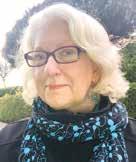

While visiting Houston in 1999, I took a taxi ride with a driver from Kenya who was studying political science at Rice University. This was during the impeachment trial for President Clinton, and I expressed my dismay to this driver, embarrassed by the political theatre going on in Washington. To my surprise, the driver responded, “No, it’s absolutely wonderful! The senators are saying so many horrible things about the president, but he doesn’t have them taken out and shot! You cannot guarantee that in my country. America really is a free country!”
That exchange has been on my mind as we watch our country slide headlong into authoritarianism. In 1999, I could feel pretty confident in saying “Well, of course the president doesn’t have his opponents taken out and shot. This is America!” However, at the rate the right to free speech is being stripped away, I’m not sure how much longer we can guarantee that. He may not be having people taken out and shot yet, but he has been gleefully bludgeoning his opponents with every other tool available to him.
In the past few weeks, we have seen the illegal seizure and detention of Mahmoud Khalil; mass deportations to prisons in other countries with little or no information, accountability, or oversight; an untold number of people being held without recourse in for-profit detention centers; orders to defund universities for continuing to provide a safe and diverse space for learning; and threats to university students to cancel their scholarships and deport them if they are caught protesting the current administration or any of its policies.
If you weren’t worried about the disappearance of our civil rights before, you should absolutely, definitely, beyond a doubt, be worried now. And we all need to speak up, loud and clear, as often as we can.
I will never forget February 16, 2003, when nearly 250,000 people marched in the streets of San Francisco, joined by millions of others around the world, to protest U.S. plans to invade Iraq. It was a massive, global show of solidarity, with many more protests following in the ensuing
weeks and months. More recently, the first Women’s March on January 21, 2017, brought millions of people together to raise their voices. We need that kind of energy in the streets now. And you can be part of it.
There are calls for a nationwide day of protest on Saturday, April 5, 2025. Wherever you may live, there will be a protest near you at noon. Mobilization groups including Indivisible, 50501, and many others are joining forces to call for a day when Americans across the country take to the streets to protest peacefully the destruction of our government, the rollback of civil rights, the attacks on the LGBTQ+ community, threats to our social safety nets, and so much more.
Please spread the word, show up, be loud, and be peaceful. Let’s show the world that Americans will not sit silently while our country is under attack. More info here: https://tinyurl.com/HandsOff5
Hit ‘Em Where It Hurts
The billionaires who are currently controlling the takedown of the U.S. government have made it clear they don’t give a darn about the American people. But there is one thing they do care about: profits.
That’s why the protests at Tesla dealerships around the world have been wildly successful. By staging an endless succession of peaceful protests outside Tesla dealerships everywhere, they have turned the once-popular brand into a pariah. Tesla sales have plummeted, their stock has plunged, and Musk is losing money. Lots of it.
Keep up the good work, folks. This is how our voices get heard: when our protests affect their stock portfolios. To join a Tesla protest near you, go to https://tinyurl.com/TeslaTKD

We have grown used to seeing many variations on acronyms for the queer community: LGBT, LGBTQ+, LGBTQIA2S+, and so on. But since the new administration took office, a jarring new set of initials has shown up, especially on government websites: LGB.
Those three lonely initials sit there looking incomplete, sad, and oh-sowrong. Using a giant AI-generated eraser, the DOGE folks attempted to simply erase any mention of transgender, intersex, two-spirit, and other folks on the gender spectrum. Their efforts are as clumsy as they are cruel. Their attempts to simply ignore or erase the very existence of anyone who doesn’t fit neatly into their extremely narrow, heteronormative definitions are wildly ignorant, scientifically inaccurate, immature, and downright heartless. They are also dangerous. By erasing the initials—and, by extension, the rich language, symbolism, and history of queer people—they are attempting to erase and dehumanize an entire population. What is regarded as insignificant becomes valueless, and therefore expendable. And when people are seen as expendable, it isn’t just their initials that start to disappear.
Francisco, long-time corporate supporters of SF Pride have withdrawn their sponsorships, cowed by these current trends. It is yet another kind of erasure.
What can we do? Fight the erasure. Be visible and loud about it. Wear all the rainbows. Call out those who wield the erasers. And, every day, stand up for those who are being erased. Let them know they are seen, valued, and loved. They need to hear our voices.
The Sisters of Perpetual Indulgence have a long history of looking out after their community by promoting safety. Now they have launched a new safety campaign: “Safety First, Sexy Second.” Devised by Sister Roma and Sister Shalita Corndog, the eye-catching campaign aims to help people navigate hookups safely, empowering people to stay safe while still having fun. Check out their campaign (and stay safe!) here: https://www.thesisters.org/safetyfirst
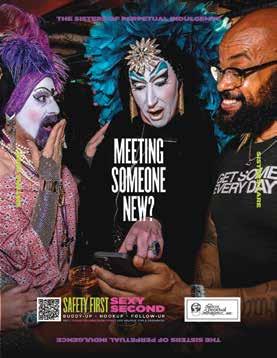

On March 20, Victor Orbán, the virulently homophobic autocratic leader of Hungary, announced new bills outlawing Pride events, and promoting the use of facial recognition technology to identify attendees. And we all know how much the current temporary-residentof-the-White-House admires and tries to emulate Orbán. Meanwhile, the MAGA extremists who are now pulling his strings are falling all over themselves to see which state legislature can introduce the most hatefully homophobic and transphobic bills.
Even here in San

The Sisters are also supporting the community through their annual grant cycle. Grant applications are being accepted through March 30 for amounts ranging from $250 to $1,000. The grants tend to be awarded to small, progressive grassroots organizations and projects that benefit the community by promoting wellness, joy, tolerance, and diversity. More info, and application link here: https://www.thesisters.org/grants
One Last Word
Friends, they are trying to crush us with cruelty. Let’s not let them. Go out and enjoy the beauty of spring, and be kind to one another.
Joanie Juster is a long-time community volunteer, activist, and ally.
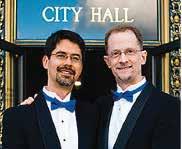
Stuart Gaffney and John Lewis
North Dakota? How could North Dakota, of all places, stand at the forefront of protecting marriage equality?
The state ranks as the third least-populated state in the country. With 800,000 inhabitants, its entire population roughly equals that of the city of San Francisco alone. Donald Trump trounced Kamala Harris in North Dakota by an over twoto-one margin last November, and the state has not cast its Electoral College votes for a Democratic presidential candidate since it did so six decades ago for Lyndon Johnson in 1964. The state has
the measure’s passage in the North Dakota House by a 52–40 margin in February. But even though the house vote was very concerning, the 12-vote margin in the legislative body where Republicans hold a 71-vote edge over Democrats means that approximately 30 Republican house members voted against the bill.
It’s also noteworthy that North Dakota’s current governor, Republican Kelly Armstrong, was a member of Congress when the Respect for Marriage Act, which protects marriage equality under federal law and safeguards it in the states if the Supreme Court were to overturn Obergefell, was enacted. Armstrong stood up for marriage equality and voted in favor of the Act, even though the state’s two Republican U.S. senators did not.
The North Dakota State Senate vote, however, is not at all grounds for complacency. In fact, it represents the opposite. The victory was only possible because of the hard work, strength, dedication, and courage of North Dakota’s LGBTIQ community, its allies, and all who believe in marriage equality.

not elected a Democratic governor in over 30 years, and Republicans overwhelmingly dominate the North Dakota legislature, holding an 82–11 margin in the House and a 42–5 margin in the Senate.
But North Dakota took its rightful position as a defender of the freedom to marry two weeks ago, when its state senate by a two-to-one margin—31–16— voted down a proposed legislative resolution that would have urged the U.S. Supreme Court to overturn its landmark Obergefell nationwide marriage equality decision. This strong rejection of the measure was due, not only to the literal handful of Democrats in the Senate, including openly gay Senator Joshua Boschee, but also because of at least 26 of the Senate’s 42 Republicans who voted against it.
The Senate vote came on the heels of
The results of recent public opinion research are further testament to the importance of this work. A North Dakota News Coop poll conducted a month ago reported that 56% of state residents supported Obergefell with only 36% supporting the anti-gay resolution. A Public Religion Research Institute (PRRI) 2024 survey released earlier this month found that 61% of North Dakotans supported marriage equality.
That’s a stunning turnaround from 2004, when North Dakota passed a statewide initiative banning same-sex marriage by a 73% to 27% vote.
The dramatic reversal demonstrates the power of numerous same-sex couples living their lives openly among their friends, family, neighbors and co-workers and not being silent. Indeed, just over two weeks after the House passed the resolution, at least one of the Republicans who had voted in favor of the resolution, Representative Matt Ruby, publicly announced that he had made a serious mistake in voting for it and urged the Senate to reject it. Ruby revealed that he learned how his vote had hurt LGBTIQ people he personally knew and cared about—members of his own family as well as soldiers he had been in the military with. People who knew Ruby had clearly spoken up in the (continued on page 18)
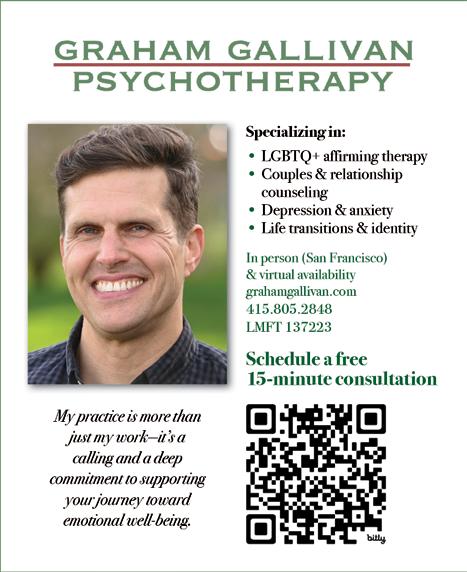



years) than men (2.2 years).

Brandon Miller
Let’s talk about something that’s not exactly fun but is super important: long-term care.
Millions of older adults and folks with disabilities need help with everyday tasks— things like getting dressed, making meals, or managing medications. This isn’t like nursing a hangover kind of help, but continued, ongoing care. And if you think Medicare’s got your back, well ... we need to chat.
But first, if you think you won’t need it, here are some sobering stats according to LongTermCare.gov:
• 7 in 10 people turning 65 today will need some form of long-term care.
• Women tend to need care longer (3.7
• 1 in 5 will require long-term care for more than five years.
If you are one of the 7 of 10, you may be thinking that surely Medicare will cover longterm care—but that’s not the case. A recent survey by KFF (Kaiser Family Foundation) found nearly 1 in 4 adults think Medicare pays for nursing home care (it doesn’t) and 45% of folks 65+ believe Medicare covers long-term care costs (also nope).
Perhaps surprisingly, Medicare does not cover custodial long-term care. It covers hospital stays, doctor visits, limited rehab care, and short-term stays in skilled nursing facilities following hospitalization.
What can cover medical costs, including long-term care, is Medicaid. It’s a state and federal program for people with limited income and assets. It’s also tricky to qualify for. In most states, Medicaid has a 5-year “look-back” period, meaning they’ll check financial transactions to make sure you didn’t give away assets to qualify. In California, this period is shrinking to 30 months and will be completely phased out by July 2026. Even so, most folks need to look at other options.
Health Savings Account (HSA)
Got a high-deductible health plan? You may
(continued on page 18)
The Hidden Benefits of a Living Trust (and Why It’s Important for Every Family)

Jay Greene, Esq., CPA
When planning for the future, many people think a will is the only option. However, a living trust offers benefits that a will cannot match. Whether you are part of the LGBTQ+ community, in a same‐sex relationship, or part of any diverse family unit, a living trust is a valuable tool to ensure your wishes are honored and that your chosen family is cared for.
Below are five key benefits of a living trust and reasons to consider creating one.
1.Avoiding Probate: A Smoother Process
A major benefit of a living trust is that it helps your estate bypass probate—the legal process that validates a will and distributes assets. Probate can be lengthy, expensive, and public, potentially leading to delays or disagreements among loved ones. A living trust allows your assets to pass directly to those you designate, ensuring a more seamless transition.
• Avoiding probate can mean faster access to assets for your loved ones, including partners, friends, or family members chosen outside of traditional definitions.
• It can help prevent potential disputes and misunderstandings that sometimes arise in families with unique structures.
2.Privacy: Keeping Your Affairs Confidential
Unlike a will, which becomes a public document once submitted to probate court, a living trust remains private. This means that the details of your assets and how you choose to distribute them stay confidential.
• Privacy can be especially important for LGBTQ+ individuals and families who may want to keep personal and financial matters out of the public eye.
•
(continued on page 18)

By Nancy Geenen, MA Ed., J.D.
Resilience is getting knocked down 10 times and getting up 11. That “grit,” as psychologist Angela Duckworth calls it, is a combination of passion and perseverance. To rise again to your feet that 11th time requires passion for the mission you have chosen, and the willingness to persevere, to keep going despite facing hardships. And, as Charles Darwin held, “It is not the strongest of the species who survives, nor the most intelligent that survives. It is the one most adaptable to change.”
During this time of volatility and uncertainty, we must focus on our well-being and our
adaptability. The strongest bias we all share is the status quo bias: the resistance to change. How we do business is changing, fast and furiously. Usually, these setbacks and disappointments are part of our growth, and they make our triumphs more worthwhile. But sometimes, setbacks are beyond our control. Resilience requires determination, but not stubbornness.
It is disappointing and humbling to admit that something we have tried and put effort, time, and even money toward is not working. But the ability to admit that something is not working and will not work due to external forces requires a special kind of adaptability. I am not suggesting that we forego our mis-

sion and goal. We have to review our situation, adjust our point of view, and pivot to stay focused on the items within our realm of control.
The capacity to restart, to adjust and adapt, and to see in each challenge an opportunity to learn is an interactive and iterative process. There is often a fine line between knowing when to keep on working at something, and when to change course. At this point, it’s important to decide whether to continue or adapt. Resilience is being able to take a long hard look at the action I am taking or the decision I have made and being able to stay open, honest, and vulnerable to learn and to make the decision to grow.
James Young has served as Founder and Creative Chairman of the marketing agency Tangible for more than two decades. He and his team partner closely with Fortune 500 and other industry-leading companies to distill complex concepts into clear strategies, stories, and designs that deliver results clients will feel. He is passionate about helping organizations define and develop their vision and goals, and bringing that vision to life with the right talent. He works closely with internal teams and students, teaching customer-centric innovation tools that enable people to unlock their creative problem-solving abilities. By giving team members the energy, knowledge, and space to tap into their own passions, he empowers them to build experiences that delight customers and grow the bottom line.

GGBA: Tell us more about Tangible.
James Young: Tangible is a customer experience consultancy and marketing firm. Think of us as being at the intersection of sales, marketing, and product. We work with brands of all sizes like Intel, Intuit, and Array by giving them creative strategies to become better versions of themselves and transform their business.
Day to day, it’s really important to me and to our company culture that we have a collaborative and fun work environment. We meet each other where we’re at: as regular people, not corporate automatons. And we do that with our clients, too. It’s in our name: Tangible. Real. Come as you are, no filter required.


GGBA: “Tangible” is a rare descriptor during this often virtual-centric time. How else does it convey your business’ mission and values?
James Young: Tangible is about being real, which means being authentically who we are and speaking honestly about the problems we’re solving. This isn’t just about our company culture; it’s about how we work with clients and what they appreciate about us. We’re that
straight-talking friend whom you can always count on to tell you the truth, and that’s what keeps clients coming back.
GGBA: When and why did you decide to create Tangible?
James Young: I founded Tangible more than 25 years ago because I saw a need to bring together creative vision and execution to help brands evolve. I love teaching teams new ways to think innovatively, and over the years, I’ve had so many opportunities to help companies at the forefront of game-changing tech express themselves more powerfully in the marketplace.
GGBA: Who are some of your role models, and especially those who helped to influence your business?
Open means I choose courage over comfort. I feel the pain and disappointment of a setback while working on the next phase of discovery, whether that means staying on the course or going back to the drawing board. Honest means I choose accountability over blame. I own my future; I don’t make excuses or look to shift accountability to others. Vulnerable means I choose to share both my disappointment with the events, and I ask for help to learn, and we all grow from the experience. As Brené Brown notes, there is a big difference between, “I am a failure,” and, “I have failed.”
(continued on page 20)

GGBA: Why do you feel it is important for your business to be a part of the GGBA?
James Young: One of my role models, even though we’ve never worked together, is David Kelly of IDEO and Stanford D-school fame. I’ve read his books in developing my training for internal enterprise teams and I use this quote frequently: “Creative confidence is the notion that you have big ideas and that you have the ability to act on them.” Everyone can benefit from internalizing this. From following him, I can tell we view the world in much the same way. That’s why I responded to his design philosophy, and I’m sure we could spark some really interesting conversations.
Funny story: I’m an adjunct instructor at the Stanford D-school. Students were giving presentations and I spotted him in the audience. It was all I could do to not be a fanboy and ask for his autograph or something!
James Young: When I was a young man in my formative years, I did not know one queer person. Not one. The only images of queer people were from movies and media, which either couched them as villains or guys who liked to wear high heels and feather boas—neither of which I identified with. Had I known just one queer person like me, it would have changed the trajectory of my life. More recently, Harvey Milk—one of the founders of the GGBA—has become a real inspiration. He represents one of many reasons why I think diversity, equity, and inclusion initiatives are so important. People need to see more people like them in leadership positions so they can feel empowered to chase their dreams as their authentic selves. I joined the GGBA with that fight in mind.
GGBA: How has being a member of GGBA helped your business so far?
James Young: Everything that we strive to accomplish at Tangible is about building genuine connections. A customer experience
(continued on page 20)
By Rabbi Sydney Mintz
In Jewish tradition we say, “Zichrono livracha,” may his memory be for a blessing. I was very honored to speak as the 4th Annual Alvin Baum Memorial Lecturer at the University of San Francisco (USF) on March 22, 2025, as someone who benefited from Al’s presence, his mentoring, his tzedakah, and his menschlichkeit.

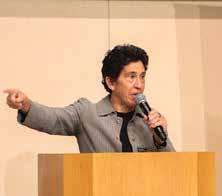

To speak at USF in the Swig Program in Jewish Studies and Social Justice is also a great honor. Because of Al’s husband Robert Holgate and their dear friend Pam David, Al’s memory continues to be a blessing through the lecture and the scholarship awards given to USF students in the program each year. I also want to honor the teachers in this program, especially my friends and colleagues Dr. Aaron HahnTapper, Oren Kroll-Zeldin, and Rabbi Camille Angel. I have had the great honor to teach in classes here in the Jewish Studies & Social Justice program at USF over the past 15 years and to host the USF students for shabbat at Temple Emanu-El.
In 1977, one of our synagogue members, Melvin M. Swig, established the Mae and
Benjamin Swig Chair in Judaic Studies in memory of his
parents. Not only was this the first endowed chair or Jewish Studies program at USF, but Swig and the university had actually broken historical ground on a global scale: it was the first Jewish Studies chair and program at a Catholic university worldwide.
With Dr. Aaron Hahn-Tapper at the helm, the Swig Program in Jewish Studies and Social Justice has blossomed with over 95% non-Jewish students, which in our day and age is amazing. To me, this is an incredible model for how to educate young non-Jewish students about the Jewish people. As we are all very aware, life on campus has been shifting precariously over the past few years and especially over the past 18 months. As a


member of both the LGBT and Jewish communities, I have never felt my identities and values challenged as profoundly as they have been over the course of the past 18 months, since October 7th.


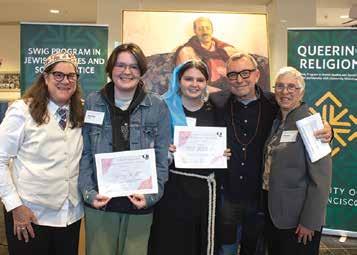
Sometimes, being yourself can be very challenging and simultaneously the most powerful example of activism and speaking truth to power. Jewish students on campus have Hillels and Chabads to support them, but I have always wondered what the best way is to educate the rest of the students who don’t know very much about the Jews or Judaism, given the fact that the Jews make up less than 2% of the American population. How do the 98% of non-Jewish students learn anything about the Jews or the Jewish community?
Since October 7, many students have learned about the Jews for the first time at Pro-Palestinian campus protests and campus encampments. The Swig program is a serious way for academic Jewish Studies to help shape a more realistic narrative of who we are as a people. I salute the Swig program that has been educating Jewish and non-Jewish students about the Jews, Jewish history, Queering Religion, and the many ways Jews express their Judaism in one of the most diverse student bodies in the country.
As Rabbi Camille Angel wrote about her position here at USF: “Some [of my students] have never met a Jew. Most of my students haven’t met a woman rabbi, let alone a lesbian rabbi who uses her own story as text. This opportunity enables me to share some

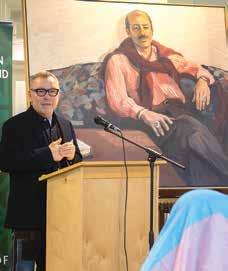
of the ideas and strategies that Jews have used over centuries to navigate intolerance and to create something better.”
At the lecture, I invited everyone to share where they or their ancestors were born in order to remind us of the origins of what was
(continued on page 20)
Dr. Marcy Adelman oversees the A ging in Community column. For her summary of current LGBT senior challenges and opportunities, please go to: http://sfbaytimes.com/challenges-and-opportunties/

Alegre Home Care is proud to support Dr. Marcy Adelman’s Aging in Community column in the
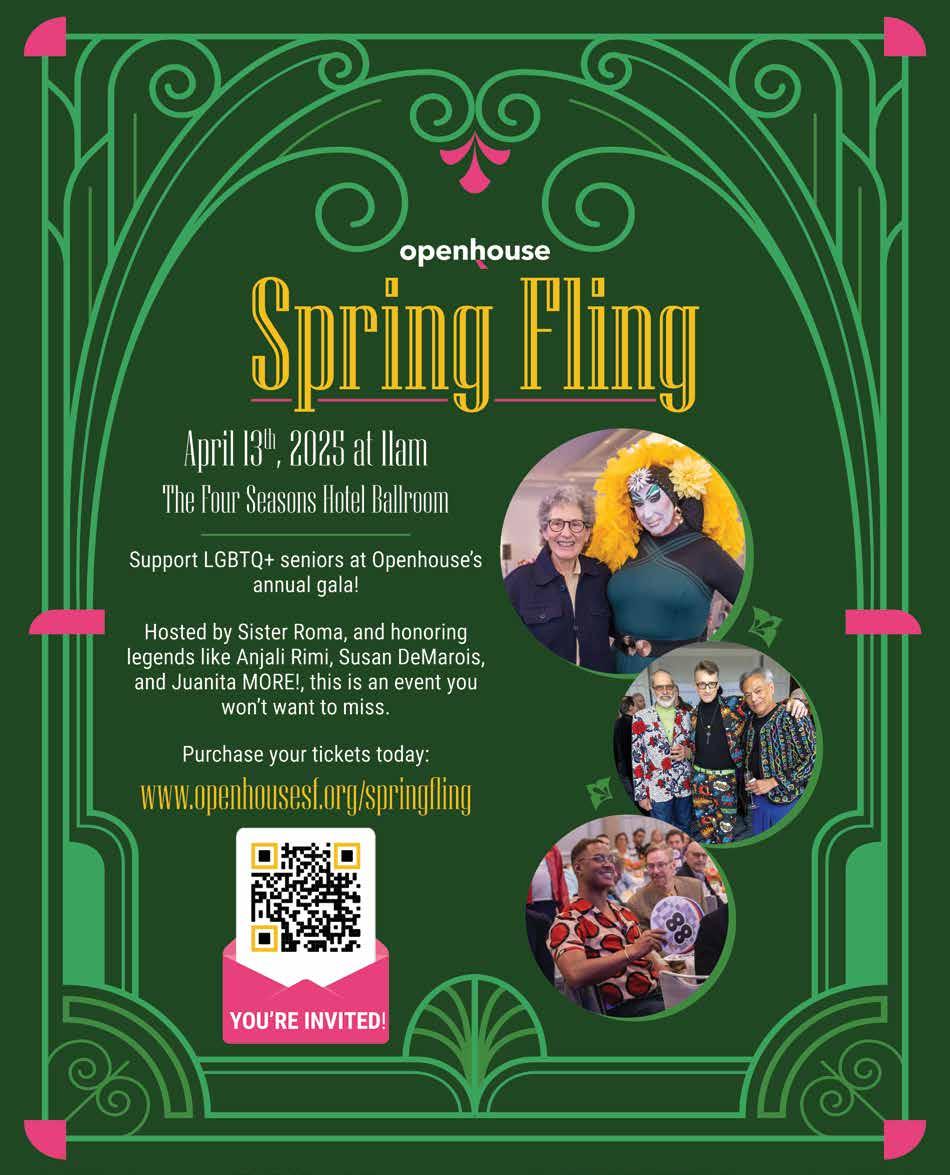


Roland Schembari and Bill Hartman, Co-Founders
Randy Alfred, Founding News Editor, 1978
Kim Corsaro, Publisher 1981-2011
2261 Market Street, No. 309
SaN FraNciSco ca 94114
PhoNe: 415-601-2113
525 Bellevue aveNue oaklaNd ca 94610
e-Mail: editor@sfbaytimes.com www.sfbaytimes.com
The Bay Times was the first newspaper in California, and among the first in the world, to be jointly and equally produced by lesbians and gay men. We honor our history and the paper’s ability to build and strengthen unity in our community.
The Bay Times is proud to be the first and only LGBTQ newspaper in San Francisco to be named a Legacy Business, recognizing that it is a longstanding, community-serving business that is a valuable cultural asset to the city.
dr. Betty l. SullivaN/JeNNiFer l viegaS
co-PuBliSherS & co-editorS
Beth greeNe, JohN SigNer, Michael delgado deSigN & ProductioN
kate lawS BuS NeSS MaNager
Blake dilloN caleNdar editor
kit keNNedy Poet-iN-reSideNce
J.h herreN techNology director
carla raMoS weB coordiNator
Mario ordoNez diStriButioN
JuaN r davila voluNteer coordiNator
CONTRIBUTORS WRITeRS
Rink, Sister Dana Van Iquity, Ann Rostow, Patrick Carney, Leslie Sbrocco, Kate Kendell, Gary M. Kramer, Joanie Juster, Robert Holgate, Eduardo Morales, Dennis McMillan, Tim Seelig, John Chen, Rafael Mandelman, Jewelle Gomez, Phil Ting, Rebecca Kaplan, Philip Ruth, Bill Lipsky, Elisa Quinzi, Liam Mayclem, Kippy Marks, Donna Sachet, Gary Virginia, Derek Barnes, Marcy Adelman, Jan Wahl, Stuart Gaffney & John Lewis, Brandon Miller, Jamie Leno Zimron, Howard Steiermann, Fernando Camino, Honey Mahogany, David Landis
PhOTOgRaPheRS
Rink, Paul Margolis, Bill Wilson, Michael Kirschner, Sandy Morris, Karina Patel, Abby Zimberg, Joanie Juster, Debra Reabock
aDVeRTISINg
Display Advertising Standard Rate Cards http://sfbaytimes.com/ or 415-601-2113
Custom ad sizes are available. Ads are reviewed by the publishers. National Advertising: Contact Bay Times / San Francisco. Represented by Rivendell Media: 908-232-2021
Circulation is verified by an independent agency. Reprints by permission only.
CaLeNDaR
Submit events for consideration by e-mail to: calendar@sfbaytimes.com
© 2025 Sullivan Communications, Inc



Marking the 30th anniversary of the Fourth World Conference on Women and the adoption of the Beijing Declaration and Platform for Action (1995), the United Nations Conference on the Status of Women (#CSW69) was held March 10–21, 2025, at the United Nations headquarters in New York City.
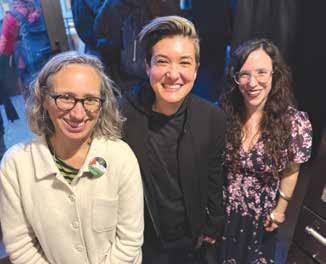
On Friday, March 14, Bay Area-based activists Julie Dorf and A. Sparks joined Jessica Stern, former executive director of Outright International and the Biden Administration’s second U.S. Special Envoy for the Human Rights of LGBTQI Persons, to participate in the Lesbians of the World Unite! protest held in Dag Hammarskjöld Plaza outside the U.N. headquarters.
Following the protest, Dorf served on an interactive panel organized by LesbianGlobal and Outright International held at the Outright offices in New York. The session was designed to strengthen the economic empowerment of queer women through use of research results and AI to connect with international funders.
LesbianGlobal founders Naomi Fine and Kathy Levinson, who are also based in the Bay Area, presented their perspectives on why and how more queer women should step up to challenges and opportunities arising from the dismantling of institutional funding for these individuals globally.
https://outrightinternational.org/



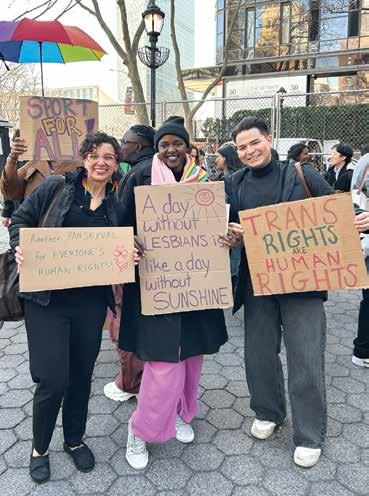
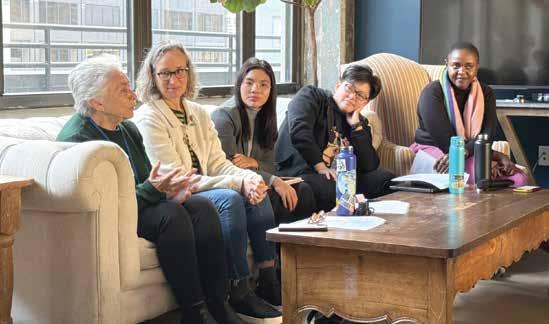
She Shocked the Sheriff I was struck by a video of a woman in a Tucson Walmart, who was confronted by male sheriff deputies in the ladies room. Kalaya Morton, 19, a cisgender, masculine lesbian, was in the bathroom during a shopping trip when a couple of uniformed officers entered the facility and asked her to stop what she was doing (changing a tampon) and come out with them. Morton came out of the stall and lifted her shirt to demonstrate her status, but that was apparently not good enough for one deputy, who said she “looked like a man,” The Advocate reported.
The craziest part of this story, in my view, is the fact that there is no bathroom law on the books in the state. According to the magazine, Morton figured that a Walmart employee had called the sheriff, since one cashier, in particular, had been eyeing her suspiciously. But on what legal basis would a working sheriff’s office dispatch two men to a public bathroom in Arizona? Why? To do what? And why allow the two male officers to enter the ladies room? Why can’t they stay outside and confront their “suspect” when she’s done?
Have we reached the point where a manly looking female may no longer visit a public ladies room regardless of any state statutes, good or bad, that may lie on the books? I gather Congresswomen Mace and Boebert got bent out of shape in the Capitol ladies room the other day and had to apologize for misgendering some innocent woman who was trying to pee. And, of course, considering the House rules require people to use the bathroom of their birth gender, I’m still waiting to see what happens when a bearded transman joins Nancy and Lauren at the sinks, or when trans Congresswoman Sarah
Rink
By Ann Rostow
McBride pops into the men’s room for a quick lipstick touch up.
Simpler Days
Moving on, I gather that Yeshiva University has finally resolved the years-long court case filed against the school by GLBT students trying to set up a campus club. The conflict between the orthodox private college and the gay students has led to the creation of a LGBTQ club that will operate according to rabbinical guidelines.
Fine fine fine. I write this because, a few years back, I remember devoting quite a bit of ink to the trials and tribulations of the Yeshiva students and the recalcitrant administration. I think Yeshiva even cancelled all student clubs at one point in order to sidestep some ruling I can’t recall.
Now I see this story as part of a different era. It’s like those apocalyptic movies where everyone is enjoying the American dream up until a tsunami engulfs lower Manhattan and the whole dynamic changes. Sally and Timmy won’t be sharing a sundae at the soda shop after all, because they’re trying to climb a cell tower in Brooklyn to save their lives! Likewise, it won’t really matter if the Yeshiva kids get to plan a pride party because they’re about to be arrested for trying to use the wrong bathroom and sent to the homophobic wing of the nearest delinquency center!
Of course, we still care, sort of. But our lives are falling apart and our civil rights movement is in correction territory. (Cue: Horrified scream fading with doppler effect as if dropping into an abyss.) We don’t care as much because we have worse things to worry about—so much so that some of us aren’t worried at all anymore because we have
Soul of Pride ( https://www.soulofpride.com ) and the Bayard Rustin Coalition ( https://www.bayardrustincoalition.com ) hosted the annual celebration of Bayard Rustin’s birthday on Saturday, March 15, at Sheba Jazz Lounge in the Fillmore District.

Among the leaders attending were Lawrence Shine, Tosca Comvalius, Lisa Williams, Ari Curry, and Linda Martley-Jordan.
Learn more about Rustin (1912–1987) at the National Museum of African American History & Culture: https://nmaahc.si.edu/bayard-rustin
thrown up our hands in despair and self-preservation. And now that we’re oblivious to the larger context, we can once again focus on things like the gay student center at Yeshiva University, just as Sally and Timmy can enjoy sharing half a pack of lifesavers from the tower landing as they watch the world being swept away below them.
Bored Penguin
In search of material, I paused on an article about a lesbian penguin in Kentucky, given that, as you may have noticed, we seem to have covered many more gay male penguins than lesbian penguins. I guess this penguin, Green Bean, has gone viral on TikTok after finding a ball and delivering it to her girlfriend, Randi.
I like it, but, honestly, I’ve been far more impressed with the egg hatching drama we’ve seen from the guy penguins. I was also quite moved by the death of Sphen, who had a very long relationship with penguin hubby Magic. Magic was heard to let out a grief-stricken wail after Sphen died.
Still, I was thinking I might stretch this penguin story out a little bit, create some colorful queer creature copy, so I kept reading about Green Bean, who seems very nice and sweet. I even watched three minutes of her appearance on a local morning show, where everyone petted her and talked about nothing. Her keeper noted that Green Bean was not a breeding penguin, because she lived with other females and was not interested. That’s the closest anyone came to revealing Green Bean’s true nature, but it was several years ago and I’m assuming this show aired before Green Bean met Randi.
That said, Green Bean’s only real claim to fame at this point is the mildly entertaining
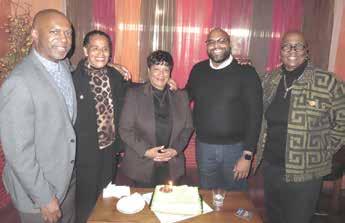

gesture with the ball on the video. Would anyone even care about the ball business if Green Bean and Randi were heterosexual penguins? I think not.
But wait! I was just about to move on when I discovered that the folks at the National Aquarium of New Zealand rank their penguins, announcing citations for the “Naughty Penguin of the Month” and the “Good Penguin of the Month.” Recently, Tux was named Naughty Penguin after he “pushed Timmy off the pier after it took him an hour to walk there,” while Mr. Mac won Good Penguin honors because he “calls out to his blind girlfriend so she can find her burrow easily.”
I have spent so much time on this, I’m embarrassed to say. That includes reading dozens of entries on the New Zealand “Naughty Penguin of the Month” list. And some of those penguins were quite naughty indeed.
On March 31, the Supreme Court will hear arguments in (deep breath) Catholic Charities v Wisconsin Labor and Industry Review Commission No, it’s not a GLBT case, but as you know by now, all religious freedom cases have an impact on our legal standing. As you also may know, we don’t seem to fare very well in cases that pit state or local authorities against anything called “Catholic Something.” At least not with this Court.
Catholic Charities is a network of nonprofits that do secular charity work under the auspices of the Catholic Church. The agencies and their national coordinators at Catholic Charities USA are not religious institutions;
(continued on page 20)



Photos by Rink
A celebration of the PRC Integrated Services Center in San Francisco was held on site at 170 9th Street on Wednesday, March 12, 2025. The event allowed the more than 90 attendees to hear stories directly from clients, to explore PRC’s services, and to meet the dedicated staff.
A highlight was the honoring of PRC’s CEO, Chuan Teng, who is nearing the end of her tenure. The organizers shared: “Chuan has been an integral part of PRC’s mission for many years, guiding the organization with dedication and vision.” She was presented with a book filled with heartfelt messages of appreciation, along with a Japanese maple bonsai tree.


Community stalwarts Gary Virginia and San Francisco Bay Times columnist Donna Sachet presented Chuan with a bouquet of flowers, thanking her for her service and expressing what a joy it has been to work with her during the years they have supported PRC. Additional tributes were given by Supervisor Matt Dorsey and PRC staff members, and Chuan was additionally presented with a congressional certificate of achievement from Speaker Emerita Nancy Pelosi.
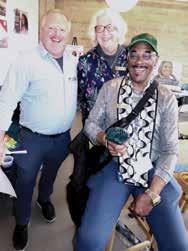
A raffle helped the organization reach a fundraising goal of nearly $10,000. It is not too late to donate and help PRC reach and ideally surpass that goal: https://givebutter.com/25PRCOpenHouse
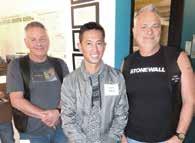

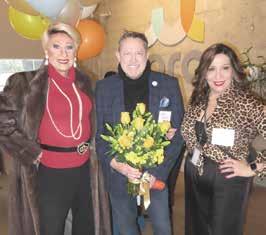
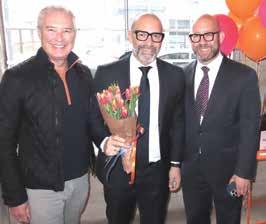

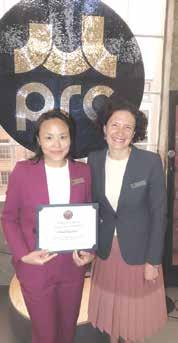
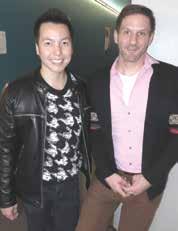



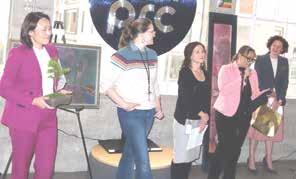

IBy Donna Sachet
magine Mary Shelley’s Frankenstein come to life on the grand stage of the War Memorial Opera House with evocative orchestral music, swirling colorful costumes, haunting Old-World sets, and vibrant emotional dance! Last Thursday’s San Francisco Ballet performance was all that and more. We can’t say enough about this beautiful production, offering so much more than we expected. The creation of the monster was visually enhanced with pyrotechnic effects, the masterful dancers gave their all, and, most importantly, the tragic story of painful separation and rejection was powerfully presented. With three acts and two intermissions, we had concerns about the length of the night, but time flew as the captivating story and extraordinary performances consumed us. Whether you are a fan of dark horror fiction or remarkable dance performance, don’t miss this marvelous production of the SF Ballet when it returns April 26 through May 4 at the Opera House on Van Ness!
“One person with passion is better than forty who are merely interested.”
Tom Connelian

San Francisco offers such a wide variety of cultural experiences and too many people miss out, especially on the performing arts. From grand opera sung by internationally famous artists to experimental theatre in a tiny space with fewer than 50 seats, a wealth of live artistic performances happens every day and night of the week, and we encourage you to take full advantage of these opportunities. As you’ll see in this column, we’ve certainly done so of late.
A new friend, Rodney Jackson, recently invited us to the Bay Area Theatre Company’s production of Reed Flores’s Cuckoo Edible Magic at the Magic Theatre at Fort Mason. The cast was young, their energy was electric, and the play took us on a wild, nearly psychedelic trip, exploring family ties, queer kids’ struggles, and universal themes of friendship and affection. We may have missed some of the more specific Filipino inside jokes, but the fast-paced action and physical comedy were instantly appealing. The theatre and the audience were small, but the engagement was genuine and the experience delightful.
A few nights later, we joined Rodney at ACT’s Toni Rembe Theater for Nobody Loves You, a lively spoof on today’s plethora of reality television dating shows. Splashy sets, carefully choreographed dance numbers, big Broadway show tunes, and an accomplished, captivating cast made for a wonderful theatrical experience. We even had a chance to peek behind the curtain at a pre-show reception with Director Pam MacKinnon. The storyline played with themes of manufactured emotional attachment, television’s nearly addictive allure, and true love’s illusive quality, making characters both appealing and repugnant and sometimes just confusing. Think of how much our lives and expectations have been influenced by so-called reality television! You have through March 30 to catch a performance.
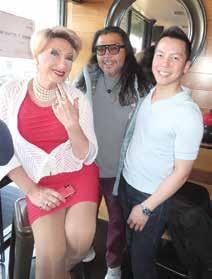
Donna
Then, we accepted the kind invitation of Billy Repp & Tom Taffel to SF Conservatory of Music Opera’s production of Leonard Bernstein’s Candide. We had forgotten so much of the music from this operetta, other than the frequently performed overture; but Glitter and Be Gay, We Are Women, and the glorious Make Our Garden Grow all came flooding back, performed richly and enthusiastically by the young student cast. The youth orchestra was fully up to the task and delightful to watch from our third-row seats. Not having been to the Caroline H. Hume Concert Hall of the Ann Getty Center for Education, we were thrilled to see such a perfect setting for this show, with simple multi-functional sets, lit dramatically, and excellent sight lines. Tying the whole performance together was our friend from Beach Blanket Babylon days, Curt Branom, as the Narrator/Voltaire, adding his own wonderful whimsy and humor. This was truly a special evening of live entertainment, worthy of its boisterous standing ovation.
So, you see, in only two short weeks, it is possible in San
Friday, March 28
Mr. SF Leather Meet & Greet
Mr. S Leather, 385 8th Street 6 pm Free!
Saturday, March 29
Mr. SF Leather 2025 Contest Emcees Lenny Broberg & Donna Sachet Produced by Ray Tilton Benefits Lyric SOMArts, 934 Brannan Street 6 pm $40 & up
Sunday, March 30
Mr. SF Leather Victory Brunch The Willows, 1582 Folsom Street 10 am $45
Wednesday, April 2
Castro Farmers’ Market Grand Re-Opening Fresh produce returns to the Castro Formal ribbon-cutting with Donna Sachet Elected officials in attendance Noe and 16th streets 4 pm Free!
Saturday, April 5
SF Gay Men’s Chorus’ Crescendo Annual gala celebration with emcee Nina West Honors Sheryl Lee Ralph & Angelica Ross Dinner, awards, entertainment Westin St. Francis Hotel $450 & up www.sfgmc.org
Francisco to immerse oneself in beautiful live music, comedy, drama, and more. What a splendid alternative to the endless drone of televised entertainment and catastrophic news. Get out there and support the performing arts!
Donna Sachet is a celebrated performer, fundraiser, activist, and philanthropist who has dedicated over two decades to the LGBTQ Community in San Francisco. Contact her at empsachet@gmail.com
GAFFNEY/LEWIS (continued from pg 9)
wake of his actions, and the representative came to realize that his vote had sent samesex couples the deeply harmful message that “you’re not welcome” here. Ruby confessed that, although he had regretted many votes during his 9-year tenure in the state legislature, “this is the first time I’ve been disappointed with myself over a vote.”
What happened in North Dakota is also a reminder that, like it or not, maintaining and increasing Republican support for marriage equality is critical to protecting the freedom to marry in today’s political climate. According to the PRRI survey, Republican support nationwide for marriage equality is at 50%, far behind 83% Democratic support and independent support at 72%, but Republican support has grown by 15 percentage points over the last decade. That support needs to increase further in coming years.
Today, a Republican supermajority controls the U.S. Supreme Court. Justices Thomas and Alito have publicly expressed interest in overturning Obergefell. But, as of today, no county clerk’s office has refused to marry a same-sex couple, a move that could set up a legal challenge to Obergefell. If a challenge were to reach the high court, we would need two Republican-nominated justices to join the three Democratic-nominated justices to uphold Obergefell. We personally believe that Roberts and Kavanaugh could do so, based on what they’ve done in some prior cases, and it is possible that Gorsuch or Barrett might support the ruling also, although we do not have any direct indication as to their inclinations.
It is also important to remember that the Obergefell decision itself was possible because one of the Supreme Court’s 5–4 Republican majority on the Court at the time— Anthony Kennedy—voted in favor and, in fact, wrote the decision. And Justice Kennedy’s sitting on the Court was not just a matter of good luck: it was the result of extraordinary organizing against President Reagan’s nomination of the ultra-conservative Robert Bork for the post. The U.S. Senate rejected Bork’s nomination, opening up the seat for Kennedy.
Despite our being encouraged by the North Dakota state senate’s vote in favor of marriage equality, we are appalled by the multiple pieces of horrific legislation that the state has passed against transgender people in recent years. We all must stand up for transgender freedom and equality as much we do for marriage equality.
We desire that the state’s dramatic turnaround on marriage equality can serve as hope that an equally strong reversal in favor of transgender people could occur there, too—and that, someday, North Dakota will stand, not only at the forefront of protecting marriage equality, but also transgender rights.
John Lewis and Stuart Gaffney, together for over three decades, were plaintiffs in the California case for equal marriage rights decided by the California Supreme Court in 2008. Their leadership in the grassroots organization Marriage Equality USA contributed in 2015 to making same-sex marriage legal nationwide.
MILLER (continued from pg 10)
be able to save in an HSA, which can be used to cover medical costs, including some long-term care insurance premiums. Contributions lower taxable income and grow tax-free. HSA withdrawals for LTC expenses are tax-free, and after 65, you can use HSA funds for anything without penalty (though non-medical withdrawals are taxed as income).
Long-Term Care Insurance (LTCI)
LTCI can help cover long-term care costs, but it’s pricey, and you need to be in relatively good health to qualify. We recommend folks seek it out in early to mid 50s. Most policies kick in when you can’t perform at least two of these six activities of daily living (ADLs): Bathing |Using the bathroom | Dressing | Getting in/out of bed | Eating | Managing continence.
Downside? Premiums are rising, and if you can’t afford them later, you could lose your coverage. Be sure to check with your current life insurance provider for add-on options or accelerated benefits too!
Long-Term Care Annuity
Think of this as a hybrid between LTC insurance and a savings plan. You invest a lump sum or make payments over time, and the policy provides a long-term care benefit. If you don’t end up needing care, the money can go to your heirs. Heads up: These products can be complicated and may not provide immediate coverage.
Self-Funding
If you have the means, you can pay for longterm care out of pocket—but let’s break down the 2023 median costs:
Assisted living: $64,200/year
Semi-private nursing home room: $104,000/year
GREENE (continued from pg 10)
Protecting your family’s information helps minimize the risk of unwanted challenges or scrutiny.
3. Control Over Distribution: Tailor Your Wishes
A living trust gives you the flexibility to specify how and when your beneficiaries receive their inheritance. You can arrange for distributions over time or set conditions that reflect your personal values and family dynamics.
Why It Matters
• This flexibility can ensure that your loved ones—whether connected by blood or chosen family—receive support in a manner that best suits their needs.
• It helps you manage how your legacy is shared, preventing the pitfalls of a large, one-time distribution.
4. Incapacity Planning: Protecting You in Life
A living trust isn’t just for after you’re gone—it also helps manage your affairs if you become unable to do so. By naming a successor trustee, you can ensure that someone you trust will handle your personal and financial matters if you become incapacitated. This avoids the need for a court-appointed process that can be intrusive and
Private nursing home room: $116,800/year
These are low-ball figures if you are aging in the Bay Area. And the tricky part? You don’t know how long you’ll need care. General recommendation is to budget for 3–5 years of care. For memory-care patients, it is more like 8–10. If you burn through savings, Medicaid might be your fallback.
Roth IRA
Unlike a traditional IRA, a Roth IRA has no required withdrawals, meaning you can keep the money growing until you need it for care or LTC insurance. Withdrawals are tax-free if you’re 59½+ and have had the Roth for 5+ years with no restrictions on how you use the money.
Using Home Equity – Reverse Mortgage or HELOC
If you own a home, you might be able to tap into home equity to help fund long-term care. With a reverse mortgage, you get monthly payments while staying in your home. The loan is repaid when you move out or pass away.
HELOC (Home Equity Line of Credit) isn’t just a way to finance a remodel; it’s a flexible way to borrow against home equity, but you must make payments, or you risk foreclosure.
Family & Community Support – Get Creative
LGBTQ+ older adults may have chosen families, and leaning on friends or community resources can be an important part of the plan. Some people cohabitate with friends or join LGBTQ-friendly retirement communities. Don’t overlook local aging services; many offer support tailored to LGBTQ+ elders.
Your long-term care plan should fit your life, your finances, and your values. There’s no
time-consuming.
Why It Matters
• A designated trustee can maintain continuity in managing your affairs, providing peace of mind for you and your loved ones.
• It allows you to outline clear instructions for managing your affairs during challenging times.
5. Flexibility: Adapting as Life Changes
Because a living trust is revocable, you can update it as your life evolves. Whether you experience changes in relationships, add new members to your chosen family, or acquire new assets, you have the freedom to adjust your trust accordingly.
Why It Matters
• Your family may evolve over time— through new relationships, partnerships, or even changes in legal recognition— and your living trust can grow with you.
• This ongoing flexibility helps ensure that your estate plan always reflects your current wishes and the makeup of your family.
A living trust is more than a planning tool; it’s a way to safeguard your legacy and
one-size-fits-all approach, but thinking ahead now can save you (and your loved ones) a lot of stress down the road. Want to chat about your options? We’re here for you.
The opinions expressed in this article are for general informational purposes only and are not intended to provide specific advice or recommendations for any individual or on any specific security. It is only intended to provide education about the financial industry. To determine which investments may be appropriate for you, consult your financial advisor prior to investing. Any past performance discussed during this program is no guarantee of future results. Any indices referenced for comparison are unmanaged and cannot be invested into directly. As always please remember investing involves risk and possible loss of principal capital; please seek advice from a licensed professional.
Brio Financial Group is a registered investment adviser. SEC Registration does not constitute an endorsement of Brio by the SEC nor does it indicate that Brio has attained a particular level of skill or ability Advisory services are only offered to clients or prospective clients where Brio Financial Group and its representatives are properly licensed or exempt from licensure. No advice may be rendered by Brio Financial Group unless a client service agreement is in place.
Brandon Miller, CFP®, is a financial consultant at Brio Financial Group in San Francisco, specializing in helping LGBT individuals and families plan and achieve their financial goals. For more information: https://www.briofg.com/
ensure that every member of your family, whether by blood or by choice, is protected and provided for. The benefits of avoiding probate, maintaining privacy, controlling distributions, planning for incapacity, and adapting to life’s changes make it a smart choice for anyone looking to secure their future.
If you are ready to explore how a living trust can work for you and your loved ones, please reach out to us for further information. We’re here to help guide you through the process and ensure that your wishes are clearly outlined and respected.
Contact Us
Call us at 415-905-0215 or email info@ greenelawfirm.com to learn more about protecting your future.
Statements In Compliance with California Rules of Professional Conduct: The materials in this article are for educational purposes only and are not legal advice. Consult an estate planning attorney for personalized guidance.
Jay Greene, Esq., CPA, is the founder of Greene Estate, Probate, & Elder Law Firm in San Francisco, helping LGBT individuals, couples, and families secure their future. For more information, visit: https://greenelawfirm.com
By Page Hodel
I am sure by now you have heard that we lost a dear sweet sister and Q family member recently, Lisa Wong. I was unable to post as I was so shocked and devastated, and needed to regain my footing to write about this monumental loss.
Lisa was such a huge part of my life as I embarked on my journey as a DJ. I think we met at the Oasis probably Sunday nights funk night. When you are a DJ, the people out on the dance floor are your fuel, your food. And I will say it: we do play favorites.
And Lisa Wong was literally one of my favorite dancers of all time. Her energy was so infectious. She lit up the room, and for a DJ, that is paramount.
We became close friends and I can’t remember a time when Lisa wasn’t part of my life and work. She was a deep and loyal friend. And throughout those early years, they were kind of our “formidable” years for a lot of us.
When I started club Q and the Box, Lisa was there. Stage managed street fairs; Lisa was there. Flyering in the Castro; Lisa was there. Brunch in the Mission; Lisa was there. She was there the opening night of club Q and the Box. Although our paths had veered apart over the recent years, Lisa has and will always remain so deeply in my heart. I actually didn’t even know she was sick.
On Saturday, March 22, I was among those celebrating Lisa’s life on her actual birthday at one of her favorite places, Dolores Park.
Page Hodel is a legendary DJ, radio mixtress, club promoter, and author. She is currently the host of RESPECT at the historic White Horse Bar in Oakland.

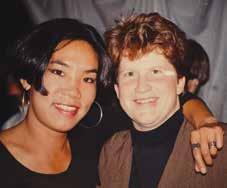


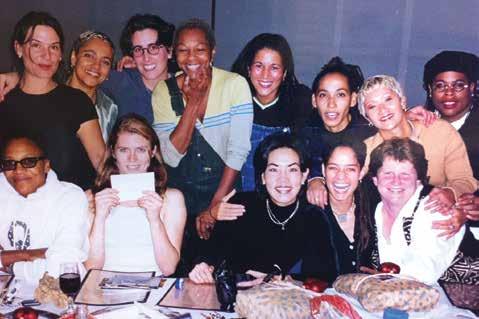


Friends, family, and loved ones of LGBTQ+ community member Lisa Wong gathered on Saturday, March 22, 2025, for a celebration of her life on her birthday.


Those in attendance were asked to, “Get on the Babe Love Train,” with a nod to the late Wong’s sense of humor, sexy dance moves, and joyous spirit. The music was even listed as by DJ Lisa Wong (curated by Black and Tori). Edaj, Page Hodel, and Young Ella Baker additionally provided music. The memorial celebration began during the afternoon at Dolores Park for a gathering friends described as “one Lisa would have enjoyed.” Participants brought blankets and seats, a blow-up sofa, and everything needed to relax, cuddle, chill, and sit together to remember Wong.
In the evening, the celebration migrated to Bissap Baobab in the Mission where a slideshow, created by close friend Hodel, was presented depicting Wong’s “good life ... her grace, her crazy fun, the endless good & loving times, and the signature hilarious brought to you only by Lisa Wong.”


GEENEN (continued from pg 11)
As the business of diversity, equity, and inclusion adjusts to the present reality, we must be ready to stand together and fight for human-centered workplaces that value the contributions of our different lived experiences. There are still good people doing good work. Find them. Support them. Become part of that stakeholder community.
Nancy Geenen is the Acting President of the Golden Gate Business Association. She is also the Principal and Chief Executive Officer at Flexibility https://www.flexability.com/
MEMBER SPOTLIGHT (continued from pg 11)
isn’t just a transaction; it’s a relationship. And being a member of GGBA isn’t just about helping our business; it’s about building community. Now more than ever, it’s important to stand up and support our fellow community members whenever we can, whether it be small business or big. So, being a GGBA member has helped us feel united and connected to our community through our work and philosophy.
GGBA: What advice would you give to someone who is thinking of starting their own business?
James Young: Don’t hide. Don’t fly under the radar. I spent too long doing that, and now that my business is out and proud of who we are and the value we bring to our clients, we are experiencing exponential growth that could have happened much sooner. Just take the leap and be open.
GGBA: Is there anything else that you would like to share?
James Young: Our tagline is “get real and get it right.” This isn’t just about business or client work; it’s about the fact that, in order to do something correctly, you have to be real about what the problem is. When you are authentic—when you get real— only then can you get it right. I’ve adopted this philosophy both in and out of work because it’s so useful, and it also comes back to being authentic. Get real with yourself, be true to yourself, and then you’ll get it right.
Contact Tangible: hello@tangible.co www.tangible.co
(continued from pg 12)
intended to be a great melting pot of diversity in the history of this country. I then shared this story from my family’s origins:
“My family came here, via Ellis Island, Chicago, and to California from Kertsh on the Black Sea of Russia in 1900. My family was full of musicians, but only one instrument, a flute, made it and continues its journey with me. This flute has come a long way from Kertsh. It was born somewhere in Europe in the 19th century and was certainly one of the many instruments that my family played in Kertsch. To my knowledge, it was the only instrument that was aboard the Wilhelm de Kaiser crossing the Pacific Ocean with what was left of my paternal family after Czar Nicolas and the Russians had their way with them. My father’s family, the Strilky’s, joined the Bolchevick Revolution in Russia
ROSTOW (continued from pg 11)
they are separately incorporated. Nonetheless, they have made every effort to weasel out of non-discrimination laws and take advantage of church exemptions that should not apply to their activities. In this case, for example, Catholic Charities wants to opt out of unemployment benefit taxes. These taxes are levied on all corporations, but religious groups are exempt. That exemption, however, applies to churchy groups, not corporations like Catholic Charities that evolved from religious projects. (Or so say San Francisco Bay Times legal experts.)
Our community got on the wrong side of one of these cases after Philadelphia refused to put foster kids with the local Catholic Charities placement operation. Catholic Charities was in violation of city nondiscrimination laws by refusing to place kids with same-sex foster parents, so Philadelphia dropped the group as a contractor. Catholic Charities sued, and the High Court found a senseless loophole to rule in their favor. At the time. Philadelphia allowed “discrimination” in placements on a case-by-case basis in order to make sure a foster match was viable. The Court ruled that these “exceptions” meant that the city must make exceptions for Catholic Charities as well.
I won’t delve into that decision any further. I know it would be fun for all of us, but I lack the mental energy. (I will note that Justice Barrett managed to preserve a useful precedent that four of her conservative colleagues preferred to trash.) Let’s just say that, with this High Court crew, anything Catholic gets a nearly automatic high five. I wonder what they’d say if the Muslim Charity Coalition wanted to avoid a corporate tax or didn’t like some city policy. Or what about my own religious home, the Church of the Flying Spaghetti Monster? (I am ordained in the faith.)
As an aside, I know that, one year, the Florida state capital was obliged to allow all seasonal displays from all religions into an area that was designated a public forum. The Pastafarian Church presented an orange office chair, filled with (fake) spaghetti, googly eyes, and a quote from scripture: “A closed mouth catches no noodly appendages.” I wonder what happened to that feature in subsequent years?
Judging Trump
We saw an excellent ruling on Tuesday, March 19, from U.S. District Court Judge Ana Reyes, who put a hold on Trump’s effort to ban transgender men and women from military service. In a 79-page opinion, Judge Reyes, who coincidentally is gay, enjoined the Trump administration from putting the anti-trans policy into effect. Even using the easiest standard of legal review for argument’s sake, Judge Reyes said the Trump rationale still failed to pass muster. Indeed, Reyes determined that the transgender plaintiffs were likely to prevail in the underlying lawsuit, and that the Trump plan was “soaked in animus and dripping with pretext.” Just reading that makes us want to hit the showers.
when Czar Nicolas began his terrible rule in the late 1880s. My uncles Nahum and Samuel were beheaded for their resistance, and my Aunt Bertha was imprisoned. My great great grandmother died on the prison steps after attempting to visit her daughter Bertha that Passover. It was a very dark time for the Jews and a very dark time for the world.”
As I reflect on the myriad ways we as Jews, as members of the LGBT community, as humans can help to change the world, to stay engaged and not to give up, I am inspired by the words of Rabbi Abraham Joshua Heschel, who taught that, when he marched with Dr. Martin Luther King, Jr., in the Voting Rights March from Selma to Montgomery in 1965, he was “praying with his feet.”
From what I understand, Trump and his associates are gob smacked that all these federal judges keep telling them what they can and cannot do, this despite the fact that so many of their power plays are flatly unconstitutional. I see in my in-box that another federal judge, Julia Kobick out of Boston, just held a hearing on the decision to stop allowing citizens to change their gender marker on their passport, as well as the cancellation of a Biden rule that allowed people to use “X” instead of “M” or “F.” Not only did Kobick point out that the new rule appears to discriminate against transgender men and women, but she noted it could “burden their ability” to use their passports.
I’m always strangely nervous when I have to present identification. You’d think I was an OSS agent stopped by a Vichy officer while delivering new radio signals in a hollowed-out baguette to my colleagues in the next village. I can’t imagine how I’d feel if I was carrying a male driver’s license. I’m assuming that Trump isn’t forcing everyone to get new passport photos that seem to reveal a different gender, but who knows?
Finally, I was touched by a New York Times essay titled “Why Dads Take Their Gay Sons to Hooters.” The author, Peter Rothpletz, recalled his grandfather awkwardly bringing him to the notorious eatery when he was in his early teens and just showing the signs of sexual ambiguity.
“Our waitress was a tall, brassy blonde—a caricature of the caricature that is a Hooters waitress,” Rothpletz recalled “She was in her late 20s with a deep yet indistinct Southern accent, and I could tell she clocked me almost immediately. Who knows if it was how I held myself or how my voice quivered or how my eyes slid away from hers. But, later in the meal, when my grandfather went to the restroom, she slipped into the booth across from me and leaned in close. ‘You’re perfect just the way you are, kid,’ she said, or something near enough to it, her voice low, kind and certain.” Years later, Rothpletz posted the memory on social media and was surprised by the number of gay men who were also dragged to this bastion of heterosexual titillation. Many of them had also experienced the graceful compassion of the waitresses, who saw immediately the motives of the grown men and the sometimes-tough road ahead of the younger ones.
“What explains the connection between Hooters waitresses and young gay men,” he asked? “Perhaps these women—so often stigmatized as almost sex workers, so accustomed to society’s sidelong glances—see kindred spirits in the boys who aren’t quite ‘right.’ Or maybe it’s simpler: a waitress’s knack for reading a room, turned tender for those who need it most.”
arostow@aol.com
I have had the great opportunity and privilege to pray with my feet for the rights of the LGBT community, the Jewish community, immigrant communities, minorities, and marginalized communities over the course of the past three decades. I take very seriously the responsibility to be “L’Or Ha-Goyim,” or a light to the nations, and to express in actions big and small the Jewish ethic of Tikkun Olam, the repair of our broken world.
Rabbi Sydney Mintz was ordained by the Hebrew Union College-Jewish Institute of Religion in New York City in 1997. She has served as the Rabbi of Congregation EmanuEl in San Francisco for the past 28 years and is currently working on her nonprofit 13th Tribe and creative projects in the Bay Area in the areas of comedy, queer culture, psychedelics, and end of life.
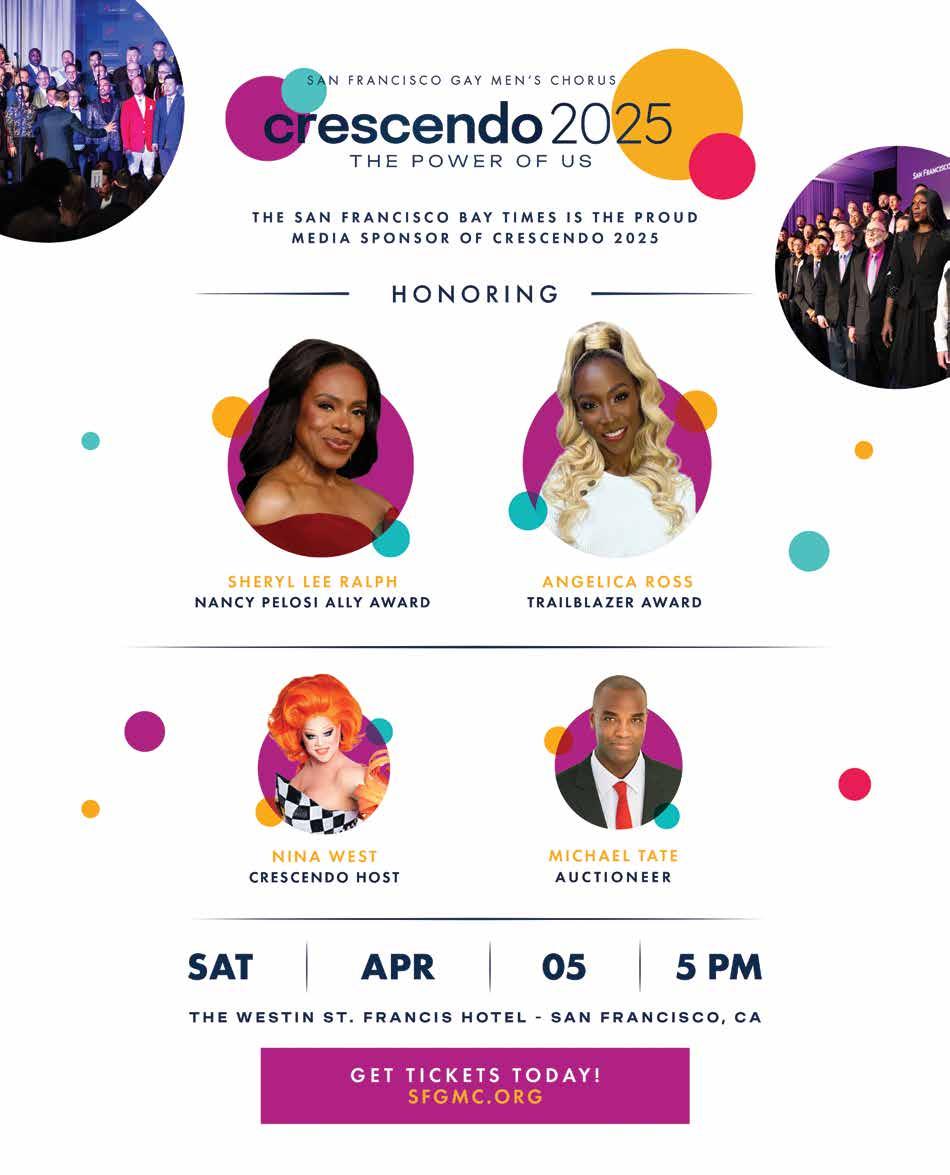
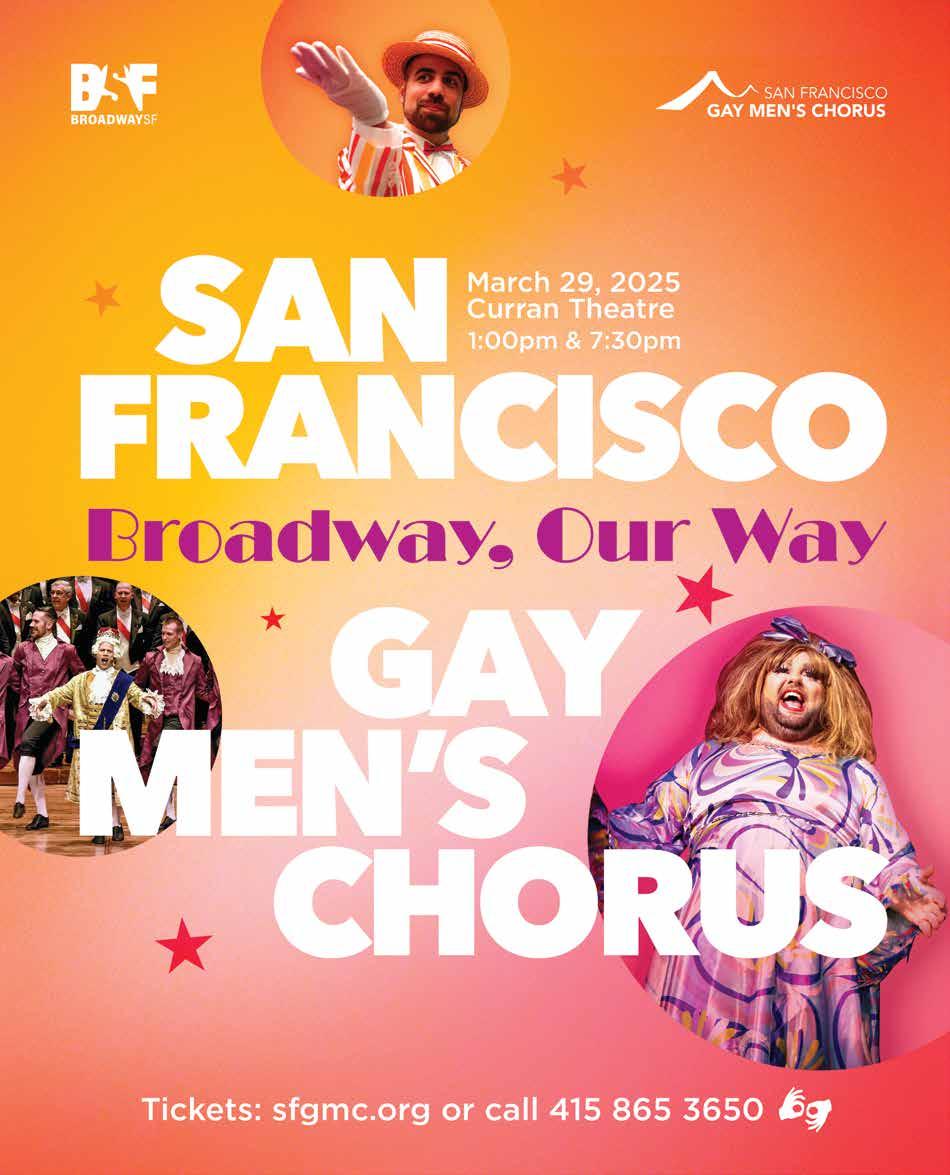
April 11–13 in SF
This April 11–13, transgender trailblazer Sean Dorsey will celebrate 20 years of being the vanguard of the Bay Area dance scene with his award-winning company Sean Dorsey Dance.
The all-queer/trans/nonbinary ensemble will treat audiences to a special retrospective program: for the first time in Sean Dorsey Dance’s history, the company will revisit and perform excerpts of audience favorites from the last 20 years.
Works to be performed at Sean Dorsey Dance’s 20th Anniversary Home Season include: Lou (2009), based on the lifelong diaries of trans activist Lou Sullivan; and excerpts from The Missing Generation (2015) and The Secret History of Love (2012), both based on extensive oral history interviews Dorsey recorded with LGBTQI+ elders across the U.S. These three works comprised an award-winning trilogy that the company performed and toured to more than 30 cities across America and internationally.
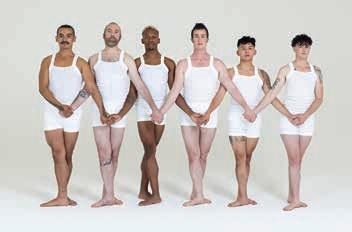
And a new addition: the company will also perform an excerpt from their 2018 work, Boys in Trouble. “I created that piece in response to the horrific attacks that were happening under that administration—and so it’s both intense and cathartic to bring some of this back now,” Dorsey told the San Francisco Bay Times
The timing of this 20th Anniversary concert is not lost on Dorsey. “It’s powerful to be performing these dances at a time when so many forces are trying to erase our history and our very existence,” said Dorsey, “We’re proud to be keeping our history and stories alive by bringing them to the stage. These dances are declarations of the worth and beauty of trans and LGBTQI+ communities.”
While there are many gay, lesbian, bi, and queer dancers and choreographers in the U.S., there are far, far fewer transgender choreographers— something Dorsey has worked tirelessly for 20+ years to change ... but even more rare are choreographic works that center queer and trans lives, history, experience, and aesthetics.
Sean Dorsey Dance is celebrated for its potent combination of full-throttle contemporary dance and theater used to lift up queer and trans bodies, lives, and history.

boldly created new space for trans and queer voices, bodies, and stories in contemporary dance.
When asked what it feels like to be celebrating two decades of his artistry, Dorsey responded, “It’s an enormous, enormous blessing. I’ve never had the opportunity to revisit and restage my works before, and it’s been an extraordinary experience. We’re hearing that these works are just as relevant and powerful today as they were when they were first premiered and touring.”
This 20th Anniversary retrospective program first premiered last September during a pre-sold-out run, and will be returning now by audience demand.
Dorsey’s life partner is acclaimed transwoman singer-songwriter Shawna Virago: “My relationship with Shawna is my foundation, my solace, and my inspiration. We have been together for 22+ years, and we are more in love every day! We must say, ‘I love you,’ a hundred times each day. We lean on each other a lot through our art-making and through these hard times.”
Dorsey also credits his collaborators: “I am blessed to have such brilliant collaborators: my dancers, who bring generosity, kindness, hard work, and inspiration; my composers, who create exquisite, exquisite compositions for us; my technical and production team, who create all the visual and audio magic flawlessly; and the Sean Dorsey Dance/Fresh Meat Productions staff, who are genius, beloved family.”

Artists are always at the forefront of any movement for social change, and with the brutal attacks on our trans and LGBTQI+ communities, we need our artists more than ever.

Dorsey has garnered many honors for his trailblazing work, including an Emmy Award, a Doris Duke Artist Award, USA Fellowship, Dance/USA Fellowship, and 5 Isadora Duncan Dance Awards.
Immeasurable beauty can be a powerful antidote to despair, and storytelling is a powerful antidote to erasure. At this brutal moment for LGBTQI+ communities across the U.S., Sean Dorsey Dance offers audiences both.
Dorsey’s dances are powerful explorations of the human experience, featuring his signature fusion of full-throttle dance, luscious queer partnering, theater, and intimate storytelling. Highly physical, accessible, rooted in story, and danced with precision, guts and deep humanity, Dorsey’s works have

Dorsey described his 20th Anniversary Home Season concert as “a balm and a respite from everything that’s going on right now.” He added, “Come be with community and recharge your batteries. Drink in beauty and the power of our community’s truth-telling.”
Advance tickets are recommended, although some walk-up tickets may be available. ASL interpretation will be offered at the Sunday April 13, 4 pm matinee performance. Dance Mission Theater is wheelchair accessible and has all-gender bathrooms.
For full show information, visit: www.SeanDorseyDance.com
View the trailer at: https://bit.ly/4kRD83p
Sean Dorsey Dance’s 20th Anniversary Home Season April 11–13, 2025
Friday April 11, and Saturday, April 12, at 8 pm; Sunday April 13, at 4 pm, with ASL
Tickets: $5–50 sliding scale with no one turned away for lack of funds
Information and tickets: www.seandorseydance.com/20thanniversary2025
Marin Jazz is proud to present An Evening With Paula West: A Birthday Celebration on Friday, April 4, 2025, at 7 pm at the Marin Center Showcase Theater in San Rafael She will be performing with a trio of allstar musicians: Adam Shulman, piano; Doug Miller, bass; and Deszon Claiborne, drums. This will be a celebratory evening featuring renowned jazz/cabaret singer West offering up a blend of classic jazz standards and beloved songs from such icons as Bob Dylan, Joni Mitchell, Glen Campbell, Rodgers and Hart, David Bowie, Johnny Cash, and more.
West is known for her rich, smooth, contralto sound and knowing her way with lyrics. The genius is in the way she interprets the songs as she continually surprises you. Rarely does an artist possess such a creative range.
“I have never once stopped listening to it, never taken it from frequent rotation. The world has changed; this Paula West album hasn’t.”
(Nathan Heller, The New Yorker)
A spellbinding performer, the West Coast singer and song interpreter has appeared at clubs and cabaret theaters from New York to San Francisco including locally at SFJAZZ, the Healdsburg Jazz Festival, Feinstein’s at the Nikko, and the legendary Plush Room, where it all began so many years ago.
Meet Paula West
West stepped onto the dimly lit stage, the smoky haze of the club swirling around her like a ghostly embrace. The audience at the intimate jazz lounge in San Francisco quieted as the pianist played the first few notes of “Lush Life.” Dressed in an elegant black gown, she took a deep breath, closed her eyes for a moment, and then let her voice spill into the room like warm honey.
For years, she had been enchanting audiences with her deeply expressive interpretations of jazz standards and Great American Songbook classics. Unlike many of her contemporaries, she was not just a singer; she was a storyteller. Every lyric she sang carried weight; every note was imbued with a lifetime of feeling. She had come a long way from her childhood in San Diego,


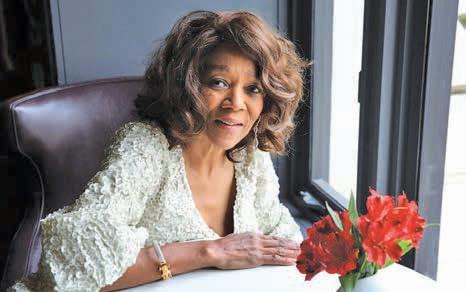
where she first discovered jazz through her parents’ record collection. Billie Holiday, Johnny Hartman, and Dinah Washington were her earliest guides, their voices etching an emotional map that she would follow for decades.
Though she had no formal musical training, West’s natural talent and determination propelled her forward. After moving to San Francisco in the early 1980s, she began performing at small venues, earning a reputation for her nuanced delivery and impeccable phrasing. Her breakthrough came in the 1990s when she started a long-running residency at the Plush Room, a revered cabaret venue. There, she refined her artistry, crafting a repertoire that blended jazz standards with unexpected gems—Bob Dylan songs, folk ballads, and even blues-infused numbers.
West’s distinct approach set her apart. While other jazz singers focused on vocal acrobatics, she leaned into the emotional depth of a song, sometimes stripping an arrangement down to its bare essence. She believed in the power of restraint, in letting silence speak as much as sound. Her voice carried the weight of experience, a sound both sophisticated and deeply human.
One of the highlights of her career came when she was invited to perform at New York’s Lincoln Center and the Algonquin Hotel’s Oak Room, a dream for any cabaret artist. Critics lauded her for her fearless interpretations and ability to make every song feel personal. “Paula West doesn’t just sing a song,” one reviewer wrote. “She breathes new life into it.”
On a particular night in San Francisco, as she reached the final lines of “Lush Life,” the audience sat in rapt silence. When the last note faded, there was a moment of stillness, followed by thunderous applause. West smiled softly, her eyes shining with quiet gratitude. She knew she had done what she always set out to do—transport her listeners, if only for a moment, to another world.


a Paula
Birthday Celebration
Friday, April 4, 2025
Doors open at 6 pm.
Full bar and plenty of ample free parking at the Marin Center Showcase Theater in San Rafael, 20 Avenue of the Flags. Tickets at www.marinjazz.com

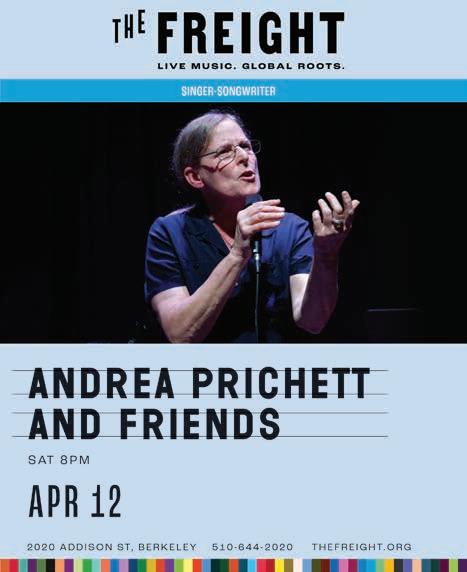

https://www.instagram.com/p/DHZqxQ5PanB/?hl=en

Film
Gary M. Kramer
Opening April 4 in the Bay Area, the charming romcom A Nice Indian Boy, directed by Roshan Sethi and adapted from Madhuri Shekar’s popular play, has Naveen (Karan Soni) being pressured by his extended family to get married. But Naveen, who is gay (and out), is reluctant to have his boyfriends—not that he currently has one—meet his traditional, but accepting, family.
That all changes when he has a meet cute with Jay (Jonathan Groff), a photographer who was adopted by Indian parents. The guys have an awkward first date, but their relationship soon grows into love. The guys even consider marriage. But then Jay meets Naveen’s parents, Megha (Zarna Garg) and Archit (Harish Patel), and things get fraught.
A Nice Indian Boy plays up its comedy and its drama as Naveen tries to salvage his relationships with both his boyfriend and his family. In doing so, he experiences emotions that dissolve his fear and open him up to deeper love.
Gary M. Kramer: Your film presents various ideas about romance, relationships, and the bigness of love from arranged marriages to meet cutes, to grand gestures, to Bollywood films, and weddings. What are your thoughts about romance as it is presented in the film as well as in real life?
Roshan Sethi: Both of us, interestingly, come from families that were born out of an arranged marriage. My parents and Karan’s parents both met each other as a set up by their parents and got married hours to days after meeting each other. We grew up with a different kind of love in our households—not the Western vision of fall in love, there is only one person for you out there.
We grew up with something that I would say was more prosaic and mundane, a more dutiful, decent, more long-lasting kind of love that wasn’t an initial burst of affection. In contrast to that, our families grew up watching Bollywood, which is full of extravagant visions of love that are so extravagant they are embarrassing, and clumsy. It is interesting that, in India, where people predominantly have arranged marriages, this (popular) art form (has) people falling in

Sethi and Soni, who are a real-life couple off-screen, spoke with me for the San Francisco Bay Times about making A Nice Indian Boy
Gary M. Kramer: Are you both nice Indian boys?
Karan Soni: I am; he is not.
Roshan Sethi: I am more of a mess. But Karan is the definition of a nice Indian boy. He really is.
Karan Soni: Roshan is a spicy Indian boy.
Roshan Sethi: I’m probably too opinionated.
love at first sight. Those contrasts are deliberate. It was an escape valve for what can be at times a repressive culture. Those are the different kinds of love we grew up with, and hopefully the film represents those two extremes. I think most relationships contain them.
Gary M. Kramer: There is considerable talk about fear, shame, and discomfort within relationships. What observations do you have about this idea and how gay men, in general, try to hide themselves and please others?
(continued on page 38)



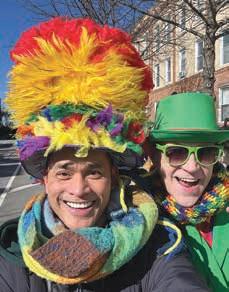

Photos courtesy of SuperFriends NYC
San Francisco Bay Times correspondent Fernando Camino, founder of SuperFriends NYC, was in Queens on Sunday, March 2, 2025, for the 26th annual St. Pat’s for All Parade ( https://shorturl.at/G6PSe ).
Brendan Fay, a gay Irish immigrant who was concerned about the exclusion of the LGBTQ+ community from Manhattan’s annual St. Patrick’s Day Parade, initiated the St. Pat’s for All Parade 25 years ago. Thousands, including city leaders, LGBTQ+ group(s), musicians, dancers, and more helped celebrate and raise awareness at this year’s parade about the Trump administration’s recent anti-transgender executive orders.
Grand Marshals for 2025 were singer-songwriter Judy Collins and Micky Murray, Lord Mayor of Belfast.
Among the attending elected officials advocating for the LGBTQ+ community was Rep. Alexandria Ocasio-Cortez, who also expressed support for both Ukraine and Palestine.
“We’re here today to send a strong message that St. Pat’s is for all, New York is for all, and America is for all,” she said. “And we also know that our Irish brothers and sisters stand with Ukraine just as we do here across New York City, and we know, just with our shared history, that we will acknowledge and stand for those whose rights have been infringed, whose borders have been infringed, and ensure that everyone is protected around the world. We stand for democracy and Palestine too.”
The motto of the St. Pat’s for All Parade is “cherishing all the children of the nation equally. It was taken from the 1916 Easter Proclamation of the Irish Republic. It is a vision drawn from our past and a guide for our present and future.
New York City’s St. Patrick’s Day Parade ended its ban on LGBTQ+ participants in 2014. Staten Island’s parade, the last such parade in the world to maintain this type of ban, took place this year with LGBTQ+ inclusion for the first time. http://www.stpatsforall.org
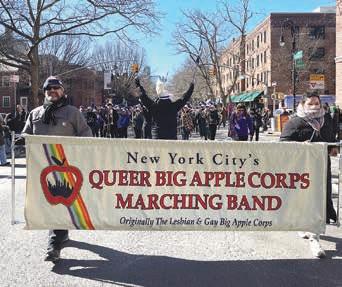
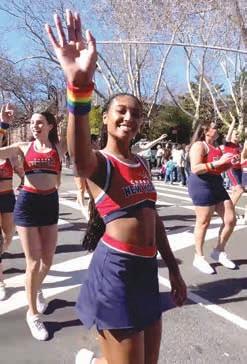
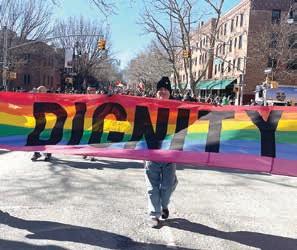



Castro Merchants Association, along with the Civic Joy Fund and CG Events, has announced that the Castro Night Market will now be held on the third Friday of each month, from 5–9 pm, through October.
A large crowd of attendees joined vendors, entertainers, and staff on Friday evening, March 21, for this month’s event held on 18th Street between Hartford and Collingwood. More than 30 vendors participated, including those offering food, merchandise, information, and other services.

Civic and elected officials attending included Castro Merchants Association President Terry Asten Bennett, District 8 Supervisor and Board of Supervisors President Rafael Mandelman, State Senator Scott Wiener, Commissioner Manny Yekutiel, and Mayor Daniel Lurie. Additional funding, provided by the Civic Joy Fund founded by Mayor Lurie and Yekutiel, has made the expansion possible to a monthly schedule. The event is free to attend but pre-registration is encouraged.
San Francisco Bay Times Volunteer Coordinator Juan R. Davila staffed a photo booth near the Main Stage in the parking lot behind Walgreens. Also representing the San Francisco Bay Times was Leticia Lópezz. DJs for the evening included DJ Rob and DJ Juanchii.
Special thanks to event managers Chris Carrington and Samantha Alvarez. https://castronightmarket.com
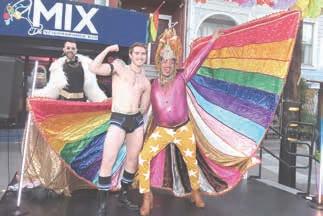
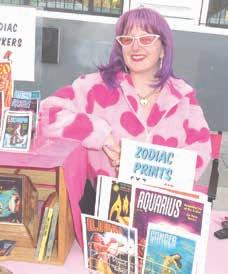

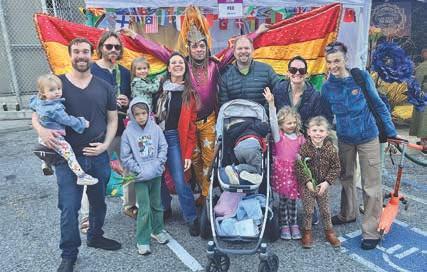



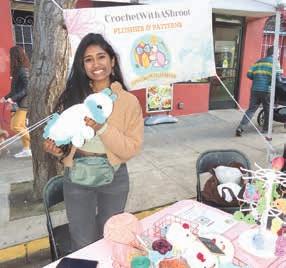
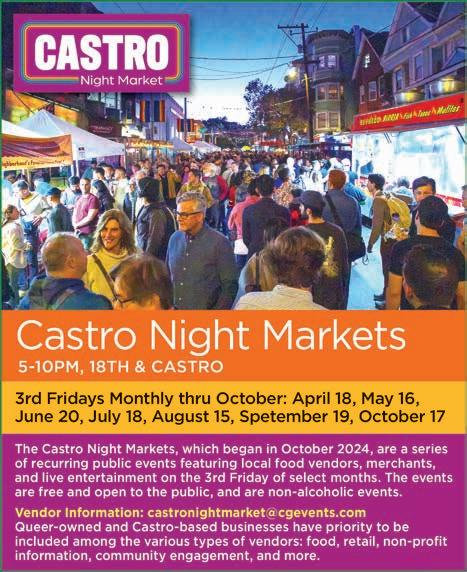
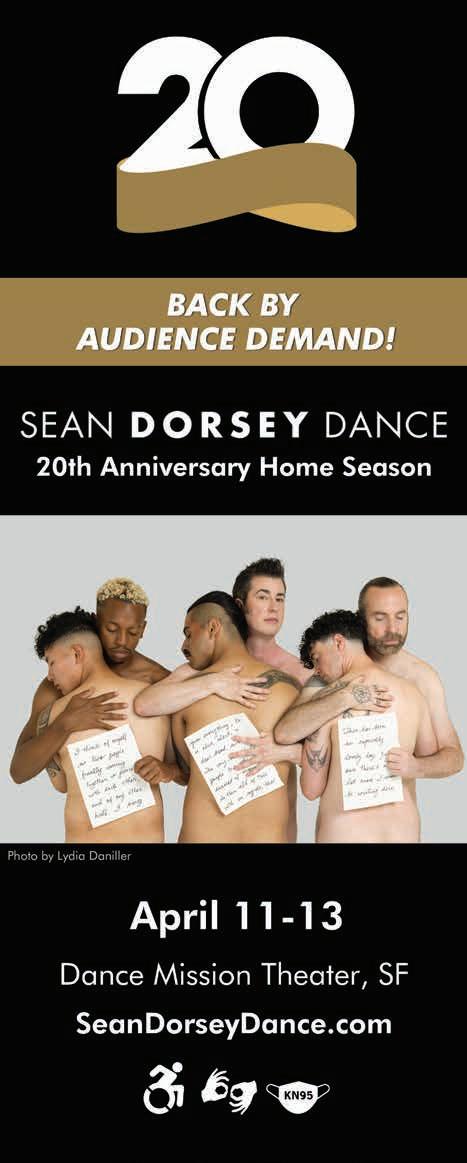

FROM BOOK PASSAGE


Stag Dance (fiction - hardcover) by Torrey Peters
A collection of three novellas and one novel, Stag Dance takes the trans genre to the next level. In it, Peters explores gender, gender roles, and identity. The novel follows a group of lumberjacks, bored at a logging outfit, who decide to throw a dance. Some volunteer to come as women.

Liquid: A Love Story (fiction - hardcover) by Mariam Rahmani
A spin on classic rom-com, Liquid: A Love Story, is about an unnamed Iranian-Indian American who during one summer commits herself to 100 dates with people of all genders.

The Pacific Circuit (non-fiction - hardcover) by Alexis Madrigal Award-winning journalist Alexis Madrigal takes a deep dive into the political and social history of Oakland, showing how it is a prime example of an American city. From segregation to technological advancements, Madrigal explores how the city and its people are affected.
Saturday, March 29, at 4 pm (non-ticketed - Corte Madera Store) Tamsen Fadal, author of How to Menopause
How to Menopause, is a guide for all women navigating every stage of midlife. The questions you don’t even know you have are answered, empowering women to be
(continued on page 40)




Ostertag delivers a phantasmagoric, yet intelligently analytical, journey through a life filled with sex, love, violence, mystery, and extreme characters. Ostertag will be reading at Fabulosa on Thursday, April 10, at 7 pm.
Thanks to the runaway success of Detransition, Baby, Torrey Peters’ new story collection has been one of the most eagerly anticipated trans-focused titles of the year. All reports are that it does not disappoint, being wildly original, well-written, and thought-provoking.
Hungerstone by Kat Dunn

Hungerstone is a feminist retelling of Joseph Sheridan Le Fanu’s 19th century sapphic vampire novel, Carmilla. Read only if you’re after something sensuous, bloody, and spine-tingling!
https://www.fabulosabooks.com/

At the First Presbyterian Church of Oakland, the Community Women’s Orchestra (CWO) presented its annual International Women’s Day concert on Sunday, March 2, 2025.
The program, entitled La Femme Francaise, was conducted by Interim Music Director and Conductor Samantha Burgess and included performances of five compositions highlighting stories of women in French music with contralto Sara Couden as guest vocalist.
Founded in 1985 by Nan Washburn, the CWO has a mission to engage, inspire, and celebrate women in classical music. The final concert of the 40th season will be presented on Sunday, May 18, in collaboration with the Berkeley Women’s Community Chorus. http://www.communitywomensorchestra.org


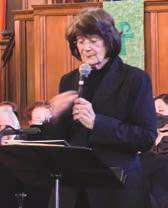





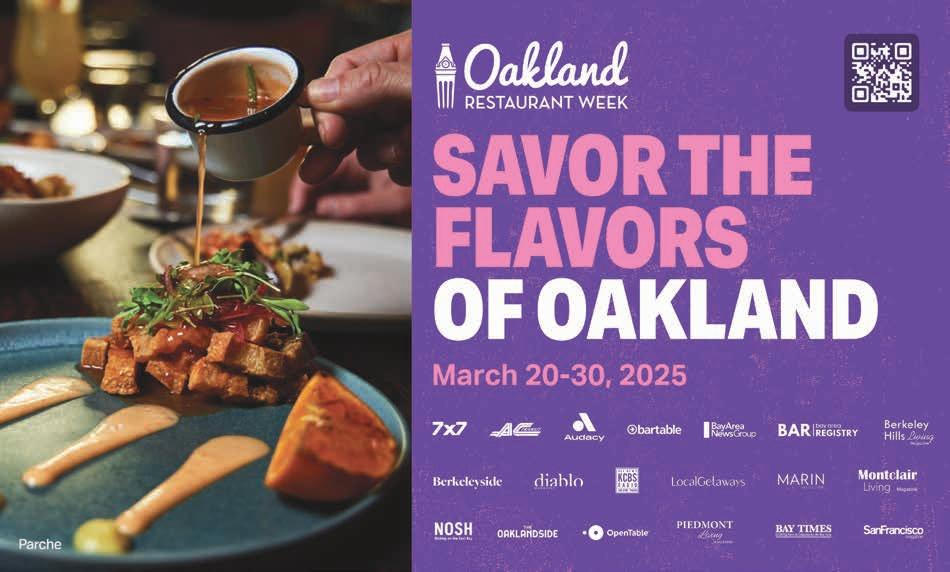
Spring is finally here. The days are getting longer, the weather warmer, flowers are bursting into bloom, and April Fools’ Day is around the corner. It is the perfect time to trick your guests with liquid deception while they’re still vulnerable from seasonal allergies. These drinks won’t cure hay fever, but they’ll make everyone remember that pollen isn’t the only culprit that makes eyes watery.


April Fools’ Day has been making fools of us all since at least 1561, when Flemish writer Eduard De Dene published a poem about a nobleman sending his servant on absurd errands. “Refereyn vp verzendekens dach/

Twelck den eersten April te zyne plach.” That is Medieval Dutch for: “I’m wasting your time on April 1st and finding it hilarious.” The servant, showing more wisdom, repeatedly mutters, “I am afraid ... that you are trying to make me run a fool’s errand.”
Five centuries later, we’ve perfected the art of sending people on fool’s errands. As America stumbles through another year where headlines read like Onion articles, we might as well make some drinks about it. At least alcohol delivers exactly what it advertises, right?
Here are my masters of deception:
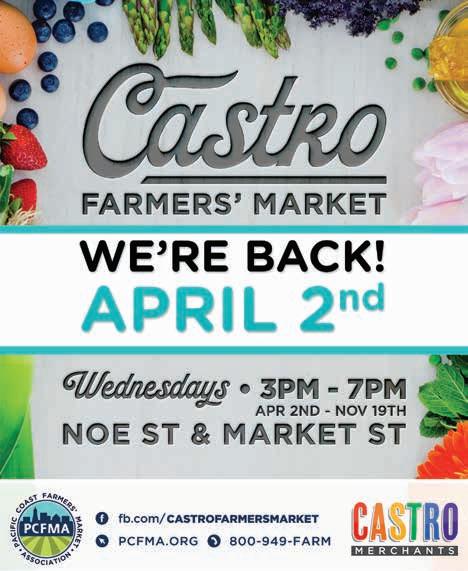

The Clear Colada
This crystal-clear concoction appears innocent until it renders you incapable of operating heavy machinery.
Looks like: water from a pristine mountain stream.
Actually is: your ticket to poor decisions.
Ingredients
2 oz clarified pineapple juice (strain fresh juice through a coffee filter 2 times, much like how we filter truth through our preferred news sources
1.5 oz Real McCoy White Rum 1 oz coconut water (not milk— we’re deceiving people, not nourishing them)
0.5 oz simple syrup
Lime wheel for garnish (the only transparent thing in the glass)
Method
Combine all ingredients in a mixing glass with ice. Stir until well-chilled and strain into a rocks glass over a large ice cube.
As you serve these deceptive libations, remember that all great jokes contain a kernel of truth—and sometimes that kernel is bitter enough to make your eyes water. Eduard De Dene’s servant in 1561 could spot when he was being played for a fool. Five centuries later, we order another round and pretend not to notice.
So, this April Fools’ Day, as we navigate an America where reality is negotiable and comes with a chaser of delusion, let’s toast to keeping our wits about us. In this strange new world, what looks refreshing might leave you with a hangover that lasts for four years.
Drink responsibly, and always read the ingredients list. You might not like what you find. (Disclaimer: No friendships were harmed in the making of these cocktails. The same cannot be said for your dignity after drinking them.)
San Francisco-based Dina Novarr enjoys sharing her passion for fine wines, spirits, non-alcoholic craft beverages, and more with others.

The Greenhouse Gimlet
Serve this vibrant green cocktail in a mason jar with a straw, and your friends will think you’ve joined the wellness movement— until they realize they’ve been bamboozled.
Looks like: a health-conscious green smoothie.
Actually is: proof that marketing beats substance every time.
Ingredients
3 oz Uncle Val’s Restorative Gin
½ frozen classic kids lime popsicle
.5 oz of fresh lime juice
handful of fresh basil (to create the illusion of nutrition)
5–6 cucumber slices (the vegetable equivalent of empty promises)
small sprig of rosemary (for that “I’m better than you” garnish)
Method
Pulse cucumber, basil, and ½ a frozen lime pop in a blender with Uncle Val’s Restorative Gin and ½ a cup of ice. Don’t tell anyone about the gin; just let them taste that buzz.
The Alternative Facts
A color-changing cocktail that proves seeing isn’t believing
Ingredients
2.5 oz gin (the foundation of delusion)
0.5 oz blue curaçao (the tears of the fact-checkers)
0.5 oz butterfly pea flowerinfused simple syrup (nature’s gaslighting)
0.75 oz lemon juice (the acid test of truth, served separately) tonic water (the bitter pill to swallow)
Method
Build the blue ingredients in a glass with ice. When your guest adds lemon juice, it transforms to purple; add tonic for swirls of pink. This essentially leads to three different “truths” from the same facts, and the perfect drink for a time when lies and truths seem to battle for the spotlight.
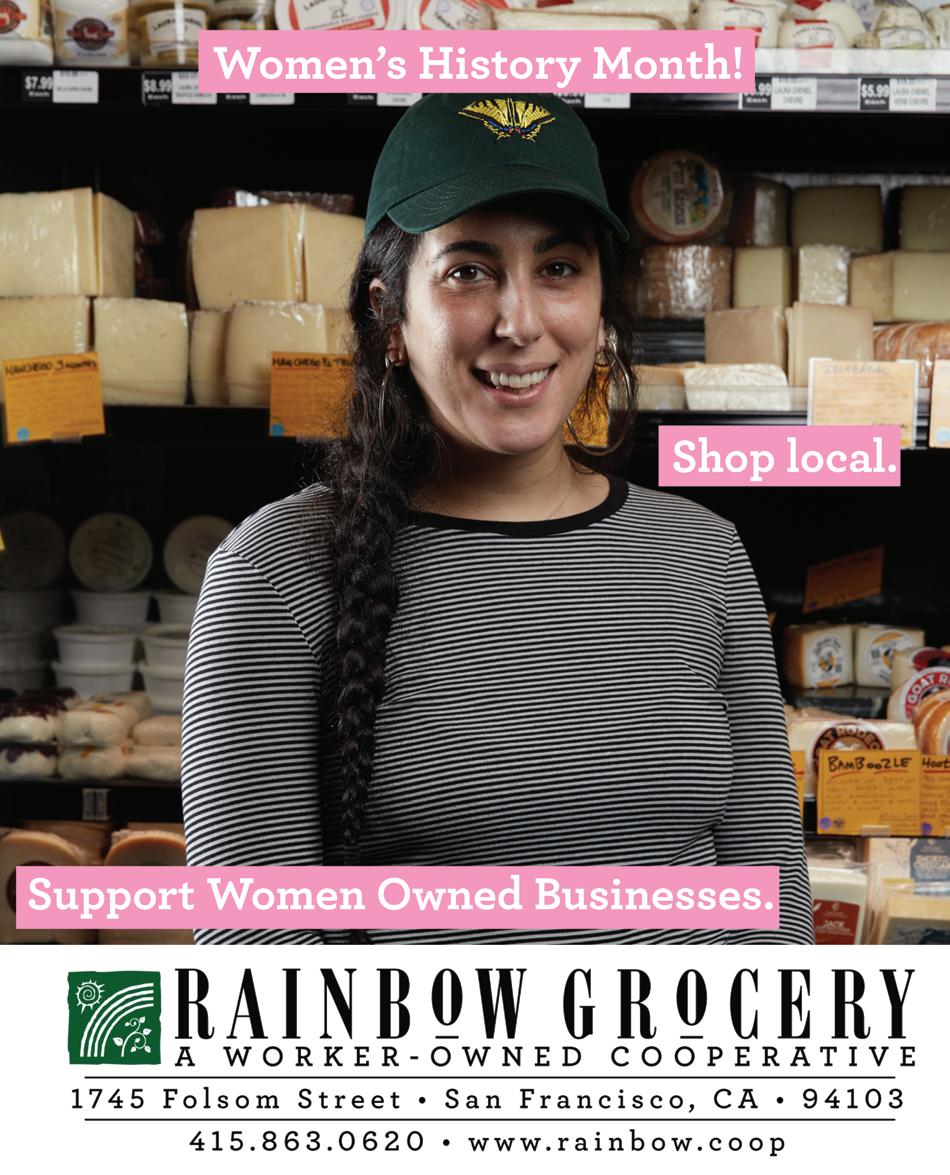

Hello! I’m Andrew Freeman and I was born with a fork in my mouth. I am delighted and honored to be filling in for David Landis, The Gay Gourmet, while he recuperates from his shoulder surgery.
For my initial article, I am celebrating the art of the dinner party. But first, here’s a little bit about me. I have been blessed to work in the Bay Area market for the last 30 years. My specialty is marketing and promotion of all things culinary: chefs, restaurants, wine, and delicious foodie products. I have two agencies, af&co. and Carbonate, which both specialize in hospitality marketing and branding. In addition to food and drink, we also represent hotels and wonderful destinations. Af&co. will celebrate 20 years in November, so to say I am beyond proud is an understatement.
I’m a Jewish gay boy from New Jersey (attention, single fellas!) and I live my life in restaurants and on trips. When I’m not working, you can find me at Barry’s Bootcamp (obsessed a bit), working with one of my amazing charities (Foodwise, REAF, Dress for Success, and Meals on Wheels), at the theater, or tooling around town with my pup Dolly (named after the legendary Miss Parton).
Okay, let’s get on with the show! As a young chubby boy growing up in Passaic, New Jersey, I was different. While quite a few people didn’t get me—my obsession with divas, my outfits, and the fine details of lower middle-class suburban living—one amazing person did, my mom, Gerry! Mom, like me, also didn’t fit into our community; she was a lively spirit who met my Dad at 19 in the Catskills (think Dirty Dancing) and made the decision to marry him and move to NJ. However, my Grandma Birdie insisted that Mom didn’t lose the foundation of her polished upbringing. So, despite the fact that we lived in a two-family row house, our apartment was always the most stylish one on the street. Mom never left the house without being in full hair and makeup, and man oh man did she rub off on me. I loved her.
One of the main lessons Mom taught me was attention to detail; when she opened up our home to host a dinner party, nothing was overlooked. She and I would sit at the Formica kitchen table and plan every detail: the menu, the décor (theme if needed), and the most important consideration was the guest list.
Mom understood, and instilled in me, that the key was curating the right mix of guests; finding the perfect balance to create an atmosphere where chemistry could thrive was essential to her. There were always the repeat guests: Aunt Millie (everyone loved her), Aunt Selma (a spirited conversationalist), and Uncle Jerry (the dapper bachelor of the family whom I sometimes believe I got my “special gifts” from—read between the lines).
By Andrew Freeman
he showed up for a minute to say, “Hey,” and make a quick exit to his basement lair. The next day, during my school lunchbreak, Mom and I would discuss the highlights of the party and make notes for the next one.
This brings me to today. I love, love dinner parties. Mind you, they are not at home; I don’t cook, but I love going to parties at which I am always the “Uncle Jerry.” When I host dinners, I love inviting groups to restaurants to enjoy amazing nights out with me. When I got the opportunity to pen this story, I thought, “Let’s celebrate the art of the dinner party.”
For my first dinner party for this assignment, I chose the legendary One Market Restaurant. Its location at the foot of Market
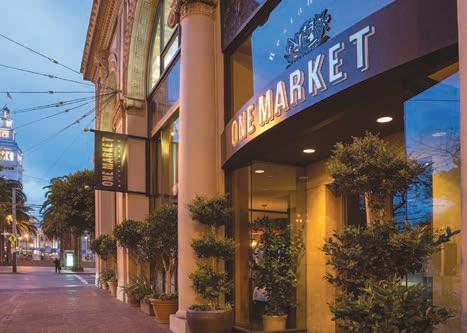
On the night before each dinner party, to my Dad’s chagrin, I was busy in Mom’s closet figuring out the right outfit for her. I mostly went for stunning evening gowns, and Mom had to convince me that something a bit simpler like a tweed pantsuit or a floral moomoo was more appropriate. I was ultimately fine because she looked gorgeous in whatever she wore.
The dinner parties would start, and though I wasn’t invited, I would linger in the kitchen listening to the chatter and assessing if we had a success on our hands. Somewhere between entrées and desserts, I was summoned to join the party in my PJs prior to bedtime to entertain the crowd for a few minutes—a joke, a song, or a funny story. In exchange, I got to eat dessert with the party. My brother Ricky was invited too, but he was usually stoned, so



Street, the amazing team, and its enduring staying power have made this spot part of the fabric of our city. This was a very special night. Chef Mark Dommen had invited Chef Nelson German, who owns two restaurants in Oakland (Ala Mar and Sobre Mesa) and is now the Chef/ Partner at the recently opened high-profile Meski in lower Nob Hill.
These two chefs came together to create a dinner celebrating Black History Month to benefit, in part, the Museum of the African Diaspora (MOAD). One Market’s amazing Wine Director, Tonya Pitts, brought in the esteemed Black winemaker Mac McDonald of Vision Cellars to work his skills in pairings for the meal.

Once everyone arrived, we got settled and I knew I had a success on my hands. The energy in the room was full of love and excitement. The amazing dishes and wines were flowing. Everyone was hugging, and plans were being made for future get-togethers.
I invited four of my favorite Bay Area personalities, and in addition to the amazing
(continued on page 35)
conversations that came naturally, I asked them three questions. The following is a summary of our dinner. I invite you to enjoy the magic that occurred that evening. You will have quite a list of spots to visit too.
My Guests
Christine Farren
Executive Director, Foodwise https://foodwise.org/ @christine.farren
Kimberly Charles
Founder & President, Charles Communications Associates
and Co-Founder, Come Together - A Community for Wine www.charlescomm.com @CharlesComm, @cbrulee
Liam Mayclem
Principal /Personality/Auctioneer
Liam Mayclem Productions, Inc https://www.bookliam.com/ @liammayclem
Peter Gamez
President & CEO of Visit Oakland www.visitoakland.com @visitoakland @sf_hunter
The Questions
Andrew Freeman: Why do you love the Bay Area dining scene?
Kimberly Charles: I love the fresh ingredients and farmers’ market-driven nature of the Bay Area. We are so lucky to be able to source, year-round, great ingredients from our beautiful state. No matter what the cuisine, we have incredible produce to choose from, and we can be hyper seasonal easily. You notice it
when you travel and see farmers’ markets in other cities that still have a lot of conventional produce. We are lucky and very blessed.
Christine Farren: Because I work for Foodwise, which runs the Ferry Plaza Farmers’ Market, I get to see many of our best chefs shopping at the market. They are incredibly collaborative and are always chatting with their fellow chef friends about what they are doing in their kitchens. What is being celebrated is sharing information, what they are excited about, what just came into the market for the week, and how they can help each other out. It feels so supportive to be this way in a pretty difficult industry. Watching these interactions really fills my cup weekly!
Liam Mayclem: It’s because of our amazing, diverse, resilient, vibrant dining scene that I have a job as the Foodie Chap on KCBS (since 2011). I have immense respect for the people behind the restaurants here in the Bay. The culinary professionals are in it with purpose, unbridled love, and mad passion. Few are in it for the money because financial success is simply not guaranteed in this arena anymore. Sad but true. To be around the amazing “foodie folk” who are in the back and the front of house inspires me always—and for those who are still at it post pandemic, I have nothing but gratitude and respect.
Peter Gamez: The Bay Area has an incredibly diverse dining scene. There are 125 languages spoken in Oakland and that diverse culture is represented in our dining scene. You can get delicious, authentic global cuisine throughout The Town. Our location is another plus with (continued on page 36)
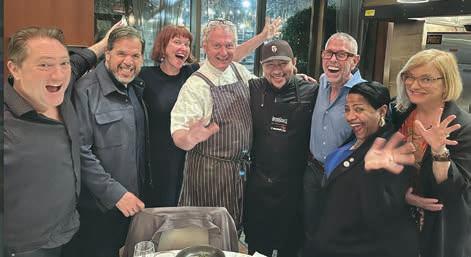


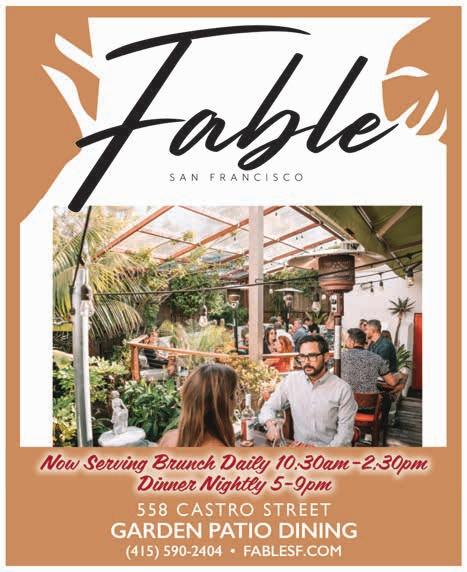

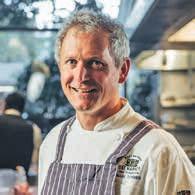
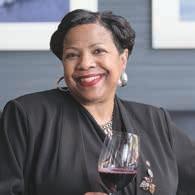

our dining scene. We are so close to other great dining destinations; 10 minutes from San Francisco, and 30 minutes from Napa and Sonoma. We are very lucky!
Andrew Freeman: What are your favorite spots right now?
Kimberly Charles: Mijote in the Mission. It’s in my neighborhood and I love it!
Christine Farren: Shuggie’s Trash Pie + Natural Wine, for so many reasons, but
mostly because it is a place designed for serious fun. And now they have jazz shows every Tuesday and Sunday from 6–8 pm. They are free! All guests are asked to do is order food and drinks and tip the performers generously. Now that’s a deal!
Liam Mayclem: Prelude has a fun, flavorful menu with a nod to the South and to the chef’s roots. The tasting menu takes you on a yummy, tasty voyage with lots of surprises. It’s one of the best meals I have had in ages. Next for me is Bon Délire, a vacation to Paris on the San Francisco waterfront. (It has) an amazing ambiance, a DJ playing vinyl, and a lively bar staff serving up inventive cocktails. The menu brims with all my French food favorites. Trust me, this place is a wow!
As for my favorite bar, it’s Casements in the Mission. The food is top of the pops and every dish takes me home to Ireland. The service at Casements is warm, the cocktails are a knockout, and there are plenty of Irish whiskeys to choose from. The cozy little back garden is the coolest spot in town.
Peter Gamez: It is impossible for me to pick a favorite. I love that I can grab the most delicious taco or burger from a local truck, enjoy an unforgettable meal at a locally owned spot, and dine at a 2-star Michelin restaurant, all while staying in Oakland. All our neighborhoods offer a unique mix of cuisine and culture.
Andrew Freeman: Your favorite restaurant or bar memory? Or favorite dish?
Kimberly Charles: I loved a drink made by Mark Guilladeu, Master Sommelier, who used to run the spirits program at Commis. He just competed in the Best Sommelier World Competition and has such talent. He made a cocktail called The Farallons and it was such a Proustian Bay Area moment where sea and land converged in the drink! It could only be relevant to those who live here in terms of the feeling and sensations it evoked.
Christine Farren: Bars with (good) live music hit a sweet spot for me. (It is) even better when the watering holes straddle that line between dive/art/and classic neighborhood bars; a place that is
undeniably unique with such a “there there” that it couldn’t be anywhere else. This, for me, is Specs’ 12 Adler Museum Cafe on Columbus Avenue. One night, I went to hear keyboardist Ray Jacildo play; he hails from Vallejo (and is now Nashville-based). He was in the Bay to visit family. I looked across the room to see Comstock Saloon owner Jonny Raglin deep in conversation with Martin Cate, the creator of Smuggler’s Cove. These two helped put San Francisco on the map for craft cocktails, and they have also been big champions for local musicians. That night was all 1960s jazz and funk. It was just one of those magic moments when it’s clear that the cultural nightlife of San Francisco is an interconnected web of passionate creators who have so many interests and identities. They are writers, musicians, businesspeople, artists, entertainers—and I’m just so grateful for the way they enrich our city
Liam Mayclem: My birthday celebration this year at Grumpy’s Restaurant & Pub on Vallejo Street. They added a drink to the menu to celebrate my special day: The Feckin’ Liam! My little party ordered over 35 of them on the fun night.
One of my favorite nights ever at a restaurant was the last night of service at La Folie by Chef Roland Passot. The room was filled with the who’s who of SF food & wine folk and Chef Passot worked it like a politician on steroids, but with caviar and champagne in hand. None of us knew that the world would close down just a few days later, and, for every one of us in that room, it was our final pre-pandemic meal and what a meal and what a night it was.
Peter Gamez: As a proud Cuban, I am always searching for the perfectly prepared plantain or a creative use of plantain. If plantains are on the menu, I’m ordering them! Every experience I have makes me so proud of our Oakland culinary community, not just for their incredible creativity and talent, but for their sense of pride, respect for their industry, and the strong unity of our community. Our chefs and restaurateurs really support each other and work together to make Oakland the best and most incredible food destination.
“Bless her heart.”
“The last two months have been the longest year of my life.”
“Old friends are the best friends.”
“Nibble this.”
“You are my sunshine.”
“I love the theater of dining.”
“I was a traveling nurse, and when I got to San Francisco, I had to stay.”
“Oh, this is a cold climate wine.”
“Salt and tears are the best medicine.”
“It looks a bit pornographic, but it’s so delicious.”
“I left a French boyfriend back in NYC.”
“Isn’t tonight nice? There is a lot of warmth in the room.”
“Drop it like it’s hot.”
The desserts were placed at our table and the chefs joined us for a few moments. We celebrated their success as we licked our spoons for the very last taste of this most delicious meal. It was a Tuesday, so I wanted to make sure my guests got home at a reasonable hour (another tip from my mom). We hugged and kissed goodbye and made plans to do it again soon. I asked each guest to describe the night in one
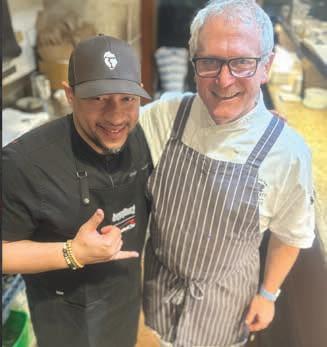
word and here’s what I heard: kinetic, connected, flavorful, blessed, and passionate. Well, I don’t think you could get a better review than that, do you?
Overheard at the Dinner Table
There are often casual lessons learned throughout such a night, and particularly with great guests. Here are some of the best lines/tips I picked up during our dinner.
I hope you enjoyed this dinner party review! I am happy to consult, and, of course, be the “Uncle Jerry” at any of your upcoming dinner parties. See you next month, when I will visit two more spots with two new groups of great people. And please, please get a group together and have a party in your favorite restaurant or a new spot. We need to support our Bay Area restaurants more now than ever! We are the capital of the food world, so get your forks out and be damn proud. Bon Appétit.
(continued on page 38)

By Sister Dana Van Iquity
Sister Dana sez, “Remember to celebrate TRANSGENDER VISIBILITY DAY on March 31 and every day!”
“International Transgender Day of Visibility” is an annual event occurring every March 31 since 2009—dedicated to celebrating transgender people and raising awareness of discrimination faced by transgender people worldwide, as well as a celebration of their contributions to society. Evident in 2024 was intensifying backlash towards trans people—be it through legislative measures (which, according to the American Civil Liberties Union, includes 479 anti-LGBTQ bills introduced across state legislatures this year alone)—to direct physical violence, declared an epidemic by the American Medical Association since 2019, (which disproportionately affects Black trans women with a majority being young people of color).
While backlash is a reality that trans people and allies are experiencing, new GLAAD polling data indicates that the vast majority of voting groups opposes candidates who campaign against transgender people’s access to healthcare and youth sports participation; and acceptance continues to rise with personal familiarity and exposure to trans stories in media.
On Sunday, March 30, TRANS MARCH SAN FRANCISCO will present the annual celebration of TRANSGENDER DAY OF VISIBILITY (TDOV) here in San Francisco. This is a day to celebrate and recognize the achievements and experiences of transgender and gender nonconforming individuals. This year they will be presenting their award ceremony and program at The Green Room, 401 Van Ness Avenue from 6–9 pm. The show will begin at 7 pm, and afterwards there will be a dance DJ’d by @kalonji.moschino. This event will be free for community members, and they will provide food. Join them in celebrating trans joy!
https://linktr.ee/transmarch
The latest preliminary injunction hearing in D.C. for Talbott v. Trump is one of two cases fighting the Trump administration’s purge of transgender people from the military. This hearing was the first since the policy released on February 26. Many new plaintiffs have joined the suit, including a transgender Army Special Forces medic
who was suddenly pulled from a combat deployment. Good news: U.S. District Court Judge Ana Reyes issued a nationwide preliminary injunction in Talbott v. Trump on March 18, blocking enforcement of the ban while the case goes forward. BTW The Army is now grappling with a staggering attrition rate among newly enlisted troops, even as recent recruiting figures suggest the service is clawing its way out of an enlistment crisis. Sister Dana sez, “Hey! Perhaps it’s a good time to STOP purging transgender people from The Army!”
COSTCO has been taking a brave stand against the Trump Administration by continually refusing to abandon its Diversity, Equity, and Inclusion ( DEI ) policies. Meanwhile 19 Republican Attorneys General are pressuring Costco to cave to the Trump Administration’s racist, transphobic, homophobic, and discriminatory agenda!
President Donald Duck turned Irish leader Micheál Martin’s March 12 visit to the White House ahead of ST. PATRICK’S DAY into yet another opportunity to insult a longtime American ally. “You took our pharmaceutical companies and other companies,” T-rump said. Ireland “has got the entire U.S. pharmaceutical industry in its grasps.” Martin tried to diplomatically and patiently explain that trade between the two countries is a two-way street. Martin noted that more than 700 Irish companies have outposts in the U.S., employing thousands of people, contributing to the domestic economy. Sister Dana sez, “I bet St. Patrick was rolling over in his grave!”
For the month of March and possibly into April, STRUT at 470 Castro Street is proudly exhibiting the art of Jesse Egner! We greatly enjoyed his exhibition, “UNAFFIXED,” at his opening reception on March 7, and then were treated to an Artist Talk on March 14—where we got quite personal and aimed questions at Jesse. He is a queer artist and educator currently based in Brooklyn, New York. Often taking the form of playful and absurd portraiture of himself and other individuals, his work explores themes such as queerness, body image, collaboration, humor, and play. His photography has been exhibited and published globally. When he first encountered the phrase, “No Femmes. No Fats,” on gay dating apps as a teen, it marked him and his body as unwelcome. “As a queer individual in the gay dating scene with a fat body and invisible disability, this rejection ignited an internal conflict between my body and my queerness,” he said. “My work emerged from this struggle, initially manifesting as self-portraiture—which felt almost self-destructive due to years of body shaming. However, I discovered a way to understand my queerness photographically through absurdity, humor, and play. The work moved beyond self-portraiture, which felt too personal, and shifted to include other queer individuals with me occasionally stepping into the frame. Collaboration
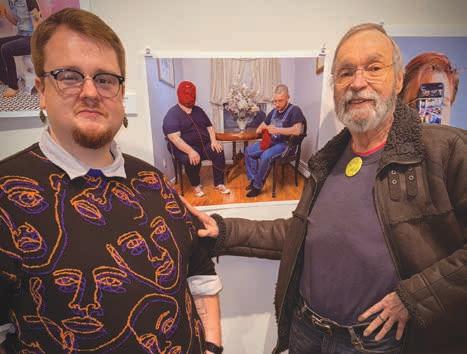
then became crucial to my work.” His photographs live in a realm of ambiguity, between reality and fantasy. He pointed out that these are not rigid definitions but fluid reflections of the transitional space of queerness. I especially enjoy three of his particularly fun self-portraits: Knit Face has his entire head wrapped in red yarn as a seated man knits it; another, aptly labeled Mermaid Tail, has his legs in a “fish tail” firmly wrapped around in rope upon rope; a third has his face almost completely covered by an affixed iPhone stuck on a dating
app. A fourth one I can’t actually write about, but made me giggle seeing a part of his body crocheted. You can check some of Jesse’s fabulous photos at https://www.jesseegner.com
On March 16, 1985, more than 60 people gathered at the SF Public Library to found the GLBT HISTORICAL SOCIETY. This year, four decades later, they just celebrated their 40th Anniversary What started as a grassroots effort has
(continued on page 40)
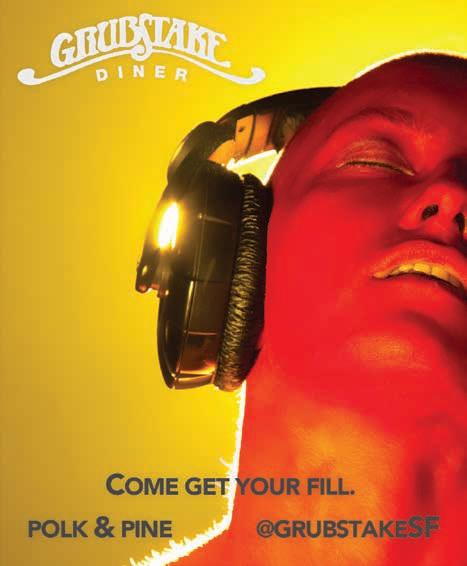
Karan Soni: It is true to how I was for most of my life before this relationship with Roshan the last few years. My particular coming out was a little bit traumatic. It didn’t go off well in the beginning with my family, but even after that, when they were “accepting” of it, I was afraid of rocking the boat again. I cannot introduce them to someone I’m dating, so it was like we were pretending that nothing was happening with my love life in any way. It is all rooted with that initial reaction; if it is not positive, you don’t want to go back to that place.
The film has so many parallels to my own life. I grew up in India, and Indians have big lavish extravagant weddings, but you never see same-sex couples celebrated the same way. It is this very bizarre, traumatizing experience to grow up with because you are not seeing people like you having this big celebration in a public way. The fact that the character in A Nice Indian Boy, wants that, and is not settling for a behind-the-closed-doors acceptance, was moving to me. This will be a cool image to see onscreen because we have not seen that in an Indian wedding. It was very moving to be in that scene and do those things, because it is something I have not experienced in real life either.
Gary M. Kramer: The film is very much playing to a broad audience, emphasizing love rather than sex. What are your thoughts about representations of queer and Indian culture and making both universal rather than specific?
Roshan Sethi: There is a sex scene and all kinds of other scenes that come from clichés of romcoms. It was important for us that the movie contained the whole spectrum of our lived existence. That is what we were aiming for.
Karan Soni: It is interesting that there is a gay love story at the center, but the parents and the sister all get a full arc. We wanted to make something you could watch with your family, because so much of gay art can be very overtly in your face. The play and film do not villainize the parents. It is gentle to their perspective. I am in a gentle mood, not villainizing people; let’s lead with love. This film puts good energy out in the world. You leave feeling better and maybe even wanting to call your parents. That’s all very Bollywood, and the film is an homage to Bollywood. Parents are a big part of our love story.
Roshan Sethi: But it’s not sanitized. There is still a sex scene. We shot the sex scene as a Bollywood sequence, through a shear sari as an Indian South Asian song is playing. This is to show a sex scene from our particular angle. Parents can watch that too. We have to be gay gay. As much as the film is not political, the existence of a gay Indian movie in 2025 is radical. Watching DEI gays fall in love is so opposite the current vibe. The only way to resist is to indulge in art like this, which generates empathy for the inner lives of people that the mainstream political system is asking you to ignore.
Gary M. Kramer: What experiences have you had as gay Indian men working in the entertainment industry?
Roshan Sethi: It is very hard right now. With Trump’s second election, the entire industry is oriented actually around fear. As a result, we are going to see less of what we’ve seen the last few years, so fewer diverse stories and fewer gay stories. It is very clear they are trying to return what they consider (to be) mainstream, not understanding that most vital art is produced at the periphery by people who do not belong to the majority of society.
We are about to watch Hollywood embark on a few years of less vital art in an attempt not to disturb the apple cart. To me, it is an incredibly ominous time. What makes it truly heartbreaking (is that), in the Biden years and around the time of BLM, we were encouraged to express who we are and produce art like this movie, that is very personal, and the message I’m receiving implicitly from the industry is the exact opposite.
Gary M. Kramer: Taking a cue from the film, who is the dramatic one in your relationship? And have you ever made a grand gesture?
Roshan Sethi: I’m dramatic in other ways. I’m not romantic. I am dramatic in the sense that I cry every day. Karan is not dramatic at all. He’s the most even keeled person, so emotionally regulated. I am all over the place.
[Karan laughs.]
Karan Soni: I confirm. [laughs]
Gary M. Kramer: I have to ask, any wedding plans?
Roshan Sethi: We are going to get married, but we are going to go to a courthouse.
© 2025 Gary M. Kramer
Gary M. Kramer is the author of “Independent Queer Cinema: Reviews and Interviews,” and the co-editor of “Directory of World Cinema: Argentina.” He teaches Short Attention Span Cinema at the Bryn Mawr Film Institute and is the moderator for Cinema Salon, a weekly film discussion group. Follow him on Twitter @garymkramer
The Spots
Ala Mar
https://www.alamaroakland.com/ @alamaroakland
Bon Délire
https://www.bondeliresf.com/ @bondeliresf
Casement’s https://casementsbar.com/ @casementsbar
Commis
https://commisrestaurant.com/ @commisrestaurant
Comstock Saloon https://www.comstocksaloon.com/ @comstocksaloon
Grumpy’s https://www.grumpyspubsf.com/
La Folie (now closed but fondly remembered by millions)
Meski @meski.sf
Mijote
https://www.mijotesf.com/ @mijote_sf
One Market https://onemarket.com/ @onemarketsf
Prelude https://www.preludesf.com/ @prelude_sf
Shuggie’s Trash Pie https://www.shuggiespizza.com/ @shuggiespizza
Smuggler’s Cove https://www.smugglerscovesf.com/ @smugglerscovesf
Sobre Mesa https://sobremesaoak.com/ @sobremesaoak
Spec’s https://www.specsbarsf.com/ @specsbarsf
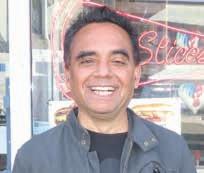

The Ferry Building https://tinyurl.com/mryz6y5u @ferrybuilding
Museum of the African Diaspora (MOAD) https://www.moadsf.org/ @moadsf
The Menu
Appetizer
Cold-Smoked Hamachi Crudo escabeche beech mushrooms, black radish, espelette
Vision Cellars Pinot Noir, Santa Lucia Highlands, Monterey County 2021 Entrées
Charred Octopus chile miso-glazed ripe plantain, jollof rice powder, green olive chimichurri, winter squash romesco
Vision Cellars Pinot Noir, Santa Barbara County 2021
Apple Wood-Smoked Bacon-Wrapped Monkfish braised red cabbage, black trumpet mushrooms, green peppercorn jus
Vison Cellars Pinot Noir, Santa Lucia Highlands 2021
Piri Piri Braised Angus Oxtail candied “yam” mousseline, mustard greens, plantain furikake, oxtail jus
Vision Cellars Red Wine, Napa County 2018
Dessert
Red Velvet Tres Leches Cake cinnamon pecan brittle, roasted banana, coconut cream cheese espuma
Andrew Freeman is the Founder of af&co ( https://www.afandco.com/ ) and the Co-Founder of Carbonate ( https://www.carbonategroup.com/ ).

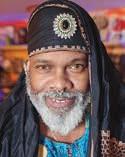
Sir Kippy Marks
“Practice Makes Love Easy” (PMLE), a phrase that I started to use around 9+ years ago during the 1st administration of POTUS (45) D.J.T, suggests that love, much like any other skill or endeavor, improves with consistent effort and dedication. By continually practicing acts of kindness, empathy, open communication, and complete acceptance of individuals and communities, we the people can strengthen our bonds and create a more harmonious global connection.
This column acknowledges those who personify PMLE, such as Kochina Rude. She is a drag queen, harm reduction advocate,
vocalist, and emcee. She is a beacon of light in our community and I was honored to recently connect with her to learn more about her efforts to uplift others, including saving the lives of countless individuals.
Sir Kippy Marks: How long have you been involved with the practicing of love in your current position?
Kochina Rude: I’ve been involved with harm reduction since learning the term as a college student. I had an internship at a local HIV/AIDS nonprofit, where I learned that harm reduction is about love: love for people who use drugs, love for every person coming in for an HIV test, and love for oneself. Twelve years later, I’m slinging Narcan to audiences in 6-inch heels (probably around 5,000 free doses to date). I never thought I’d be doing this, but I never really had long-term goals either. Recently, I’ve decided to make a big change, because I’ve learned that change is the only way to grow. I like to flip the phrase “the ends justify the means,” as I arrived where I am today by practicing the opposite. As long as I love what I’m doing in this moment, I trust that wherever I end up is where I’m meant to be. To do anything, I have to love it; and to love what I do, I need to love who I am.
Sir Kippy Marks: Who or what motivated you to become the community activist that you are today?

At seven years old, Raven, a Labrador Retriever mix, has a heart as golden as his years. This gentle, soulful pup is looking for a loving home where he can enjoy the comfort and companionship he deserves.
Raven may take a little time to warm up, especially in bustling city environments, but once he feels safe, his affectionate nature shines. Whether lounging by your side or enjoying a peaceful stroll, he’s the perfect companion for someone seeking a loyal friend. With each day, he’s gaining confidence, learning to navigate the world at his own pace—one paw at a time.
Thanks to a generous donor, Raven’s adoption fee has been fully covered, making it easier than ever to bring him home. Now, all he needs is someone ready to open their heart to this sweet boy.
If you’re looking for a devoted friend to share life’s quiet moments, come meet Raven at the SF SPCA Mission Campus. The adoption center is open Wednesday through Sunday from 11 am to 6 pm and Tuesday from 1 to 6 pm.

Kochina Rude: I was your average queer misfit stuck in the North Bay suburbs as a young person, acutely aware of all the ways I didn’t feel like I “fit in.” As I got older, I actively sought a lifestyle that rejected the norms of the world around me, and in doing so, I found myself in community with others who were—well, “othered.” Many of the people I have loved most in this world have been drug users, people with mental illnesses, or social rejects. Because of this, I’m motivated to use my skills, privileges, and platform to advocate for people who are stigmatized, and whose voices are often ignored.
Sir Kippy Marks: How old were you when you made that decision?
Kochina Rude: As flattering as it is to be described as a community activist, I never thought of myself as such, and don’t remember ever making the decision to become one. (I’m not rejecting it; I just don’t think about it that way.) Maybe it was as a high school junior, when my friends and I cut class to participate in a protest. Perhaps it was at age six, when a close family friend died of AIDS. It could have been when I got my first STI test as a teen, and was mistreated to the extent that I’ve made it my professional mission to make sure no one experiences what I did. Or, I was “born this way” from parents who loved me unconditionally, and who were hip enough to encourage me to “live out loud.”

Sir Kippy Marks: What advice would you give to others on how to practice love on the daily?
Kochina Rude: Meet people where they are, whenever possible. Love is best practiced as a verb. Remember that the oxygen mask must go on your own face before assisting others, so you must practice meeting yourself “where you are,” too. The Venn diagram between “radical empathy” and “self-love” is a circle. Don’t tell me you love me; show me.
(continued on page 40)
An Inseparable Bunny Duo and a German Shepherd With Silky Fur and a Heart Full of Love

Calvin and Hobbes


A 100-pound, 5-year-old German Shepherd with a silk-soft coat and heart full of love, Ladybird is seeking her forever home. She is working on shedding a few pounds, which will help improve her mobility. That is true for many of us! Her gentle and affectionate nature shine through every step of the way.
Calvin and Hobbes are an inseparable duo of bunnies, bonded by a deep friendship and a shared love for adventure. They are outgoing and friendly, always eager to greet visitors with excited hops and enthusiastic nose twitches. Calvin is the mischievous instigator, while Hobbes is the loyal companion who follows along with unwavering devotion.
They are playful rabbits who adore spending time together, especially when it involves playing with toys. Whether it is chasing after balls, tossing around chew toys, or solving puzzles, they approach every play session with boundless energy and enthusiasm, and their antics never fail to entertain.
The OAS adoption process focuses on matching you with a pet who is a good fit for you and your family. Come by during open adoption hours Thursdays 12–7 pm and Fridays/Saturdays/ Sundays 12–3 pm to adopt your new best friend, or to learn more about the OAS adoption process. Please see the OAS website to learn more about how you can help by adopting, fostering, volunteering, and donating: www.oaklandanimalservices.org

grown into an internationally recognized institution. The GLBT Historical Society now safeguards over 1,000 collections in their archives. In a typical year, an average of 20,000 people visit the country’s first museum of LGBTQ history and culture.
On March 18, we were delighted to attend the Fabulosa Books Author Reading Session of HELLO STRANGER: MUSINGS ON MODERN INTIMACIES by Manuel Betancourt . “Hello Stranger” is a fascinating book about chance encounters—at a bar, through social media, in a bathhouse—and what a stranger can reveal about who we are and who we could still yet be. A stranger can provide endless possibilities. As Betancourt looks back on his past relationships, he turns to characters and narratives that helped him question notions of what monogamy and couple-dom (and relationships and marriage) can and should look like. From films, poetry, and the musicals of Stephen Sondheim , the author uses pop culture to make sense of the alluring prospect of forging intimacies with strangers—even, or especially, the strangers within ourselves In both a personal excavation and a broad cultural critique, he examines everything from online sexting and real-life cruising to divorces and throuples. He examines the intimacies we crave, value, and oftentimes destroy. Go buy this marvelous book at Fabulosa Books, 489 Castro Street, Sin Francisco!
Nazi-loving Trump recently reposted an article to his Truth Social account with the image of a pink triangle, a symbol used during the Holocaust to identify gay men in Nazi concentration camps. The triangle was overlaid with a red circle and a line through it, suggesting “gays not allowed” or even more drastically “death to the gays, like the good ol’ Nazi days.” Sister Dana sez, “Could this bigot BE any more homophobic and dangerous to the LGBTQ community? It’s time to de-throne the ‘king’ of autocracy!’”
AFROSOLO THEATRE COMPANY
will present Arts Festival 31, LET FREEDOM RING! PART 2 on March 28 and 29 at 7 pm and March 30 at 3 pm, located at Potrero Stage, 1695 18th Street, SF. AfroSolo Theatre Company’s mission is
BOOK PASSAGE (continued from pg 30)
to nurture, promote, and present African American and African Diasporan art and culture through solo performances and the visual and literary arts. Since 1994, the annual festival has been a forum for African Americans and the larger African Diaspora as a way to give voice to the unique experience of being Black. Through art, they bring people of all ethnicities together to explore and share the human spirit that binds us all. Tickets and info at https://afrosolo.org/
Recently, nine state legislatures launched efforts to overturn marriage equality While it’s a long shot due to the Obergefell v Hodges ruling and Respect for Marriage Act, headlines about these attempts have sparked panic in the LGBTQ community and generated fears about what else is to come. North Dakota’s state House passed a resolution to ask the Supreme Court to overturn Obergefell. This would have been the first state to move this effort forward. Fortunately, the North Dakota Senate swiftly rejected the resolution. Sister Dana sez, “What is it about that simple word, ‘equality,’ that frightens Repugnican politicos so badly?!”
Elon “mouthy” Musk, who was raised during South African apartheid, used to steer clear of debate about race. Now, he frequently advocates for White people. Sister Dana sez, “Yes, because we white folx are just so very discriminated against. Oh, boo hoo.”
California Democratic Governor Gavin Newsom has been elevating and embracing right-wing media stars such as Charlie Kirk and Steve Bannon by featuring them as guests on his new podcast. Sister Dana sez, “This is not just alarming, it’s irresponsible and the complete opposite of what we need from our progressive and Democratic elected officials right now!”
SAN FRANCISCO PUBLIC
LIBRARY will present this year’s edition of the NIGHT OF IDEAS on April 5, 7–11 pm, 100 Larkin Street. Leading thinkers, scholars, writers, activists, and artists will engage with the theme
their strongest selves. Fadal will be joined in conversation by author Jen Marples.
Monday, March 31, at 6 pm (ticketed - Corte Madera Store)
Kate DiCamillo, author of Ferris and Because of Winn-Dixie
This is a celebration of the 20th anniversary edition of Because of Winn-Dixie and DiCamillo’s highly acclaimed work, Ferris. A story of growing up, Ferris follows a young girl trying to navigate a summer of mayhem. Her sister wants to be an outlaw, her grandma is talking to a ghost, and there’s a raccoon invasion.
Sunday, April 6, at 2 pm (non-ticketed - SF Ferry Building Store) Illah Nourbakhsh, author of Turn Left: An Immigrant’s Life of Connection and the Search of Belonging
An Iranian-born immigrant in the United States, Nourbakhsh explores the question, “Where do I belong?” as he examines his sense of self through childhood to the present.
https://www.bookpassage.com/
SAN FRANCISCO BAY TIMES MARCH 27 , 2025
“(Un)Common Ground.” Everyone will explore the vital role of civil society in mediating our differences and charting a shared destiny. The night’s conclusion at 1 am invites attendees to boogie down at SF Discothèque in the Library’s atrium. And we Sisters of Perpetual Indulgence will put camp and whimsy into arts & crafts with our “Sister Sock Puppet Workshop” and a Bohemian Rhapsody lip-sync finale parade in the Library’s Atrium. Also, on display will be huge oil paintings of rainbow Sister Dana and other naughty nuns by fabulous artist Deidre Defranceaux https://sfpl.org//04/05/night-ideas
This ain’t no “April Fools!” joke. Join in the fight to uphold the Constitution and end executive overreach on April 5 for PEOPLE’S VOTE DAY: 50 protests, 50 states, one movement in partnership with WOMEN’S MARCH and HANDS OFF https://www.fiftyfifty.one/
THE PEOPLE’S MARCH/FIGHT FASCISM FOR DEMOCRACY will be a march and rally on April 12, noon to 3 pm in SF supporting everyone under attack by the current government administration. Nobody should live in fear because of their color, faith, gender, sexual orientation, ancestry, or political beliefs. More on this in my April 10 column.
Several corporate sponsors have pulled out of SAN FRANCISCO’S 2025 PRIDE CELEBRATION over what the parade’s Executive Director Suzanne Ford suspects is due to the country’s changing political climate under the Trump administration. San Francisco Pride’s street fair is scheduled for June 28–29, with the famed Pride Parade scheduled for 10 am on the second day. Founded in 1970 as the Gay Freedom Day Parade, the event has grown to become one of the largest and most renowned LGBTQ celebrations in the world, attracting up to one million visitors each year.
Hungarian lawmakers have just passed a law banning Pride events and allowing authorities to use facial recognition software to identify attendees, continuing a crackdown by dictator Prime Minister
SIR KIPPY MARKS (continued from pg 39)
Sir Kippy Marks: If you were granted two universal wishes, what would you wish for?
Kochina Rude: An endless supply of Baked Lays. 2. World peace.
Sir Kippy Marks: Please share any current practices that our readers may find useful, and also where we can find you.
Kochina Rude: At every moment in your life, you have choices. No one can make those choices but you. Learn how to forgive yourself, while also knowing when to hold yourself accountable for your decisions. Believe in yourself as a survival tactic.
Here is where you can find me:
I’m stepping away from Princess, the amazing show I’ve co-hosted for five years with Lisa Frankenstein and producer Tito Soto. You can catch me one last time at SF
Viktor Orbán’s right-wing populist party on the country’s LBGTQ community.
Dictator Trump rolled back on March 14— the day before the possible shut-down of the Federal Government—over a dozen former executive orders and directives signed by former President Biden focused on gender, labor policies, and industry regulations. One of these revoked Biden’s action to protect transgender human rights.
House Speaker MAGA-Mike Johnson, before elected as 56th speaker, had said that programs like Social Security, Medicare, and Medicaid pose an “existential threat” to the American way of life and the “whole form of government.” So, just hours before the March 14 shutdown deadline, House Republicans passed a Continuing Resolution bill to increase defense spending by 6 billion dollars and to SLASH “domestic non-defense” spending (such as Medicaid) by 13 BILLION DOLLARS, all to give tax cuts to the ultrawealthy. Every House Democrat, but one, opposed. All, but ten, Senate Democrats opposed. The CR (“Crappy Resolution”) bill thereby passed. Trump then quickly signed it— the very next day on March 15—giving the Trump administration significantly more leeway to spend federal dollars without Congressional approval. On March 16, House Democrat Leader Hakeem Jeffries addressed the Republicans regarding Medicaid, exhorting, “House Republicans are lying! Their own budget resolution set in motion up to 880 Billion Dollars in cuts to Medicaid! That would be the largest Medicaid cut in American history.” Sister Dana sez, “This is utterly UNACCEPTABLE! Millions of Americans rely on Medicaid for lifesaving healthcare, and for so many other vital societal NON-DEFENSE needs. How dare the RepubliCan’ts do this to us!”
The Democrat lawmakers are finally growing a spine. They are taking it to the streets with “Fight Oligarchy!” rallies attended by thousands upon thousands of agitated citizens from both red and blue states. Sister Dana sez, “We have to STOP the rich from getting richer while the poor are getting poorer!”
Oasis on Saturday, April 19. (It will sell out.) I have some potential Oakland-based projects on the horizon, but in the meantime, you can catch me and God’s Lil Princess on our monthly podcast, Diva Dudes, free on Substack & available on Spotify. (Diva Dudes are coproducing the first “Gutterbutt Pageant” in partnership with the Oaklash Bay Area Drag Festival at Eli’s Mile High Club on Thursday, May 15.) And see what I’m up to at the frequently updated https://linktr.ee/kochinarude
Sir Kippy Marks is a spirited solo entertainer whose shows are permeated with an infectious joy. His distinctive sound arises from his heart, through his 1822 violin consort, Izabella. Marks’ rare talent, broad smile, and radiant warmth will brighten any event to create lasting impact. He is also Grand Duke XL of The Grand Ducal Council of San Francisco. He is the first ever elected African-American Grand Duke.
Photos courtesy of Drew Altizer Photography

For Mardi Gras this year, Tuesday, March 4, 2025, celebrants gathered at Grace Cathedral to enjoy Carnivale, the cathedral’s popular annual fundraiser. The evening included dinner and cocktails by McCalls; music by The Chris Clouse Project and a New Orleans Traditional Brass Band, Twilight; a magazine-style photoshoot experience with Vanity Portrait Studio; and more hosted by The Rt. Rev. Austin K. Rios, The Very Rev. Dr. Malcolm Clemens Young, and the Grace Cathedral Board of Trustees.
After the official program, The Late Night Revelry part of the evening began. It included a playlist curated by The Chris Clouse Project, glittering cocktails, and a dance party in a starlit chapel.
On Sunday, April 13, many attendees of this fundraiser along with LGBTQ+ community members and more will be headed to Grace Cathedral for “A Conversation With Bishop Mariann Edgar Budde: How We Learn to Be Brave.” Bishop Budde earlier this year carried out what The New York Times called “an extraordinary act of public resistance” when she addressed President Trump during the high-profile inaugural prayer service. She implored him “to have mercy on the people in our country who are scared now,” from those who are part of the LGBTQ+ community, to immigrants and refugees. https://gracecathedral.org
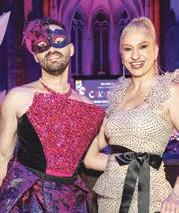

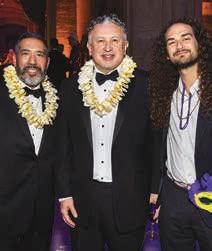
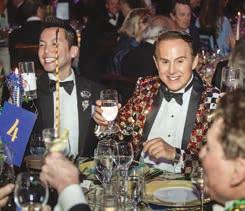

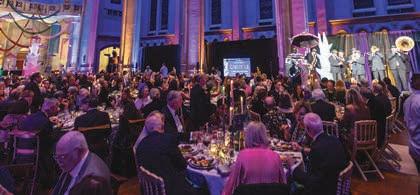

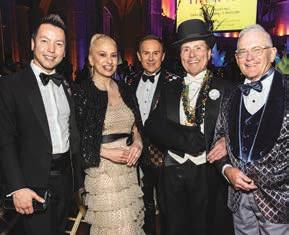
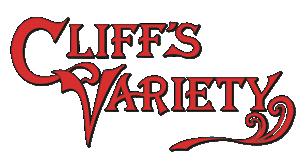

Feel like staying home and hiding under a blanket? Get cozy with our selection of woven throws made from recycled cotton. We have assorted colors and styles for $34.99 each.
Air plants are back in stock! Add a pop of color to your space with these uncomplicated, versatile, and resilient tillandsias.
We have six different varieties available, starting at $7.99 each.

Keep up with Cliff’s Variety news at Facebook ( https://www.facebook.com/CliffsVariety ) & Instagram ( https://www.instagram.com/hilario_sf/ )

